#which is a problem of how books are marketed recently
Explore tagged Tumblr posts
Text
MLMs are the mirror-world version of community organizing

If you'd like an essay-formatted version of this post to read or share, here's a link to it on pluralistic.net, my surveillance-free, ad-free, tracker-free blog:
https://pluralistic.net/2025/02/05/power-of-positive-thinking/#the-socialism-of-fools

In her unmissable 2023 book Doppelganger, Naomi Klein paints a picture of a "mirror world" of right wing and conspiratorial beliefs that are warped, false reflections of real crises:
https://pluralistic.net/2023/09/05/not-that-naomi/#if-the-naomi-be-klein-youre-doing-just-fine
For example, Qanon's obsession with "child trafficking" is a mirror-world version of the real crises of child poverty, child labor, border family separations and kids in cages. Anti-vax is the mirror-world version of the true story of the Sacklers and their fellow opioid barons making billions on Oxy and fent, with the collusion of corrupt FDA officials and a pliant bankruptcy court system. Xenophobic panic about "immigrants stealing jobs" is the mirror world version of the well-documented fact that big business shipped jobs to low-waged territories abroad, weakening US labor and smashing US unions. Cryptocurrency talk about "decentralization" is the mirror-world version of the decay of every industry (including tech) into a monopoly or a cartel.
Klein is at pains to point out that other political thinkers have described this phenomenon. Back in the 19th century, leftists called antisemitism "the socialism of fools." Socialism – the idea that working people are preyed upon by capital – is reflected in the warped mirror as "working people are preyed upon by international Jewish bankers."
The mirror world is a critical concept, because it shows that far right and conspiratorial beliefs are often uneasy neighbors with real, serious political movements. The swivel-eyed loons have a point, in other words:
https://locusmag.com/2023/05/commentary-cory-doctorow-the-swivel-eyed-loons-have-a-point/
Once you understand the mirror world, you start to realize that many right wing conspiracists could have been directed into productive movements, if only they'd understood that their problems were with systems, not sinister individuals (this is why Trump has ordered a purge of any federally funded research that contains the word "systemic"):
https://mamot.fr/@[email protected]/113943287435897828
This also explains why the "tropes" of right wing conspiratorialism sometimes echo left wing, radical thought. I once had a (genuinely unhinged) dialog with a self-described German "progressive" who told me that criticizing the finance industry as parasitic on the real economy was "structurally antisemitic." Nonsense like this is why Klein's "mirror world" is so important: unless you understand the mirror world, you can end up believing that "progressive" just means "defending anything the right hates."
Historian Erik Baker is the author of a new book, Make Your Own Job: How the Entrepreneurial Work Ethic Exhausted America, which has some very interesting things to say about the mirror world:
https://www.hup.harvard.edu/books/9780674293601
In a recent edition of the always-excellent Know Your Enemy podcast, the hosts interviewed Baker about the book, and the conversation turned to the subject of pyramid schemes, the "multilevel marketing systems" that are woven into so many religious, right-wing movements:
https://www.dissentmagazine.org/blog/know-your-enemy-the-entrepreneurial-ethic/
MLMs have it all: prosperity gospel ("God rewards virtue with wealth"), atomization ("you are an entrepreneur and everyone in your life is your potential customer"), and rabid anti-Communism ("solidarity is a trick to make you poorer").
The rise of the far right can't be separated from the history of MLMs. The modern MLM starts with Amway, a cultlike national scam that was founded by Jay Van Andel and Richard DeVos (father-in-law of Betsy DeVos).
Rank-and-file members of the Amway cult lived in dire poverty, convinced that their financial predicament was their own fault for not faithfully following the "sure-fire" Amway method for building a business. Andrea Pitzer's gripping memoir of growing up in an Amway household offers a glimpse of the human cost of the cult:
https://www.theatlantic.com/ideas/archive/2025/01/amway-america/681479/?gift=j9r7avb6p-KY8zdjhsiSZxYkntna5M_rYEv4707Zqqs
Amway – and MLMs like it – don't just bleed out their members by convincing them to buy mountains of useless crap they're supposed to sell to their families, while enriching the people at the top of the pyramid who sell it to them. The "toxic positivity" of multi-level marketing cults forces members deep into debt to pay for seminars and retreats where they are supposed to learn how to repair the personal defects that keep them from being "successful entrepreneurs." The topline of the cult isn't just getting rich selling stuff – they're making bank by selling false hope, literally, in Hilton ballrooms and convention centers across the country, where hearing an MLM scammer berate you for being a "bad entrepreneur" costs thousands of dollars.
Amway destroyed so many lives that Richard Nixon's FTC decided to investigate it. The investigation wasn't going well for Amway, which was facing an existential crisis that they were rescued from by Nixon's resignation. You see, Nixon's successor, Gerald Ford, was the former Congressman of Amway co-founder Jay Van Andel, who was also the head of the US Chamber of Commerce, the most powerful business lobbyist in America.
At Ford's direction, the FTC exonerated Amway of all wrongdoing. But it's even worse than that: Ford's FTC actually crafted a rule that differentiated legal pyramid schemes from illegal ones, based on Amway's destructive business practices. Under this new rule, any pyramid scheme that had the same structure as Amway was presumptively legal. Every MLM operating in America today is built on the Amway model, taking advantage of the FTC's Amway rule to operate in the open, without fear of legal repercussions.
MLMs prey on the poor and desperate: women, people of color, people in dying small towns and decaying rustbelt cities. It's not just that these people are desperate – it's that they only survive through networks of mutual aid. Poor women rely on other poor women to help with child care, marginalized people rely on one another for help with home maintenance, small loans, a place to crash after an eviction, or a place to park the RV you're living out of.
In other words, people who lack monetary capital must rely on social capital for survival. That's why MLMs target these people: an MLM is a system for destructively transforming social capital into monetary capital. MLMs exhort their members to mine their social relationships for "leads" and "customers" and to use the language of social solidarity ("women helping women") to wheedle, guilt, and arm-twist people from your mutual aid network into buying things they don't need and can't afford.
But it's worse, because what MLMs really sell is MLMs. The real purpose of an MLM sales call is to convince the "customer" to become an MLM salesperson, who owes you a share of every sale they make and is incentivized to buy stock they don't need (from you) in order to make quotas. And of course, their real job is to sign up other salespeople to work under them, and so on.
An MLM isn't just a pathogen, in other words – it's a contagion. When someone in your social support network gets the MLM disease, they don't just burn all their social ties with you and the people you rely on – they convince more people in your social group to do the same.
Which brings me back to the mirror world, and Erik Baker's conversation with the Know Your Enemy podcast. Baker starts to talk about who gets big into Amway: "people who already effectively lead by the force of their charisma and personality many other people in their lives. Right? Because you're able to sell to those people, and you're able to recruit those people. What are we talking about? Well, they're effectively recruiting organizers, people who have a natural capacity for organizing and then sending them out in the world to organize on behalf of Christian capitalism."
Listening to this, I was thunderstruck: MLM recruiters are the mirror world version of union organizers. In her memoir of growing up in Amway, Andrea Pitzer talks about how her mom would approach strangers and try to lead them through a kind of structured discussion:
Everywhere we went—the mall, state parks, grocery stores—she’d ask people whether they could use a little more money each month. “I’d love to set up a time to talk to you about an exciting business opportunity.” The words should have seemed suspect. Yet people almost always gave her their number. Her confidence and professionalism were reassuring, and her enthusiasm was electric, even, at first, to me. “What would you do with $1 million?” she’d ask, spinning me around the kitchen.
This kind of person, having this kind of dialog, is exactly how union organizers work. In A Collective Bargain, Jane McAlevey's classic book on labor organizing, she describes how she would seek out the charismatic, outgoing workers in a job-site, the natural leaders, and recruit them to help bring the other workers onboard:
https://pluralistic.net/2023/04/23/a-collective-bargain/
Organizer training focuses on how to have a "structured organizing conversation," which McAlevey described in a 2019 Jacobin article:
“If you had a magic wand and could change three things about life in America [or her town or city or school], what would you change?” The rest of your conversation needs to be anchored to her answers to that question.
https://jacobin.com/2019/11/thanksgiving-organizing-activism-friends-family-conversation-presidential-election
The MLM conversation and the union conversation have eerily similar structures, but the former is designed to commodify and destroy solidarity, and the latter is designed to reinforce and mobilize solidarity. Seen in this light, an MLM is a mirror world union, one that converts solidarity into misery and powerlessness instead of joy and strength.
The MLM movement doesn't just make men like Rich De Vos and Jay Van Andel into billionaires. MLM bosses are heavy funders of the right, a blank check for the Heritage Foundation. Trump is the MLM president, a grifter who grew up on the gospel of Norman Vincent Peale – a key figure in MLM cult dynamics – who tells his followers that wealth is a sign of virtue. Trump boasts about all the people he's ripped off, boasting about how getting away with cheating "makes me smart":
https://pluralistic.net/2024/12/04/its-not-a-lie/#its-a-premature-truth
The corollary is that being cheated means you're stupid. Caveat emptor, the motto of the cryptocurrency industry ("not your wallet, not your coins") that spent hundreds of millions to get Trump elected.
Tech has its own mirror world. The people who used tech to find fellow weirdos and make delightful and wonderful things are mirrored by the people who used tech to find fellow weirdos and call for fascism, ethnic cleansing, and concentration camps.
In Picks and Shovels, my next novel (Feb 17), I introduce readers to a fictitious 1980s religious computer sales cult called Fidelity Computing, run by an orthodox rabbi, a Catholic priest and a Mormon rabbi:
https://us.macmillan.com/books/9781250865908/picksandshovels
Fidelity is a faith scam, a pyramid scheme that is parasitic upon the bonds of faith and fellowship. Martin Hench, the hero of the story – a hard-fighting high tech forensic accountant – goes to work for a competing business, Computing Freedom, run by three Fidelity ex-employees who have left their faiths and their employers to pursue a vision of computers that is about liberation, rather than control.
The women of Computing Freedom – a queer orthodox woman who's been kicked out of her family, a Mormon woman who's renounced the LDS over its opposition to the Equal Rights Amendment, and a nun who's left her order to throw in with the Liberation Theology movement – are all charismatic, energetic, inspirational organizers.
Because of course they are – that's why they were so good at selling computers for the Reverend Sirs who sit at the top of Fidelity Computing's pyramid scheme.
Hearing Baker's interview and reading Pitzer's memoir last week made it all click together for me. Not just that MLMs destroy social bonds, but that within every person who gets sucked into an MLM, there's a community organizer who could be building the bonds that MLMs destroy.
#pluralistic#amway#mlm#picks and shovels#martin hench#devos#that makes me smart#rich devos#mirror world#doppelganger#naomi klein#crime fiction#technothrillers#books#cults
1K notes
·
View notes
Text
Styles of Prep - Games that Care
Yet another of the lies that Wizards of the Coast has sold TTRPG players, which they've bought into wholeheartedly, is that there are different styles of preparation, and all are valid for every game (because both are valid for D&D, and D&D is right for every game, of course.)
I'm gonna go over a couple games I've run, and explain that actually they all care about the type and level of preparation the GM does.
Indie games are often honest and open about what they want. To take a high-prep example, I recently ran Eureka: Investigative Urban Fantasy. It is not subtle! In the narrator section, right after the introduction, it says "We cannot advise you strongly enough to use prewritten adventure modules". It's not just there - throughout the rules, there's an emphasis that the situation, the state of the world at the outset and thus at every time that follows, is known and rigid. Eureka is a mystery game - the who, what, how, why, and more are all set in stone. The narrator is forbidden to change the scenario on the fly.
Eureka is very forceful of this because the authors, writing a game for mystery investigations, are well aware that it's damn near impossible to make a coherent mystery up on the fly. I'm sure they've tried. I've tried. It's impossible. Something will contradict, and you won't notice until well after the players have reasoned from that contradictory information. It can be done, but not well, and the mental load on the GM is going to kill them.
It's not a genre thing - Eureka is a game about the act of solving mysteries, but so in Brindlewood Bay. I don't have experience with Brindlewood Bay myself, but I do know that the GM doensn't have a real mystery ahead of time - there's a move which is rolled to determine whether a theory is correct. Both are mystery games, but they approach them differently - and each makes a vastly different demand of the GM's preparations.
On the opposite end of the spectrum from Eureka, more in line with Brindlewood Bay in fact, is just about every Powered by the Apocalypse game. Apocalypse World is very clear about what to prepare, and it's more or less the opposite of Eureka: "Daydream some apocalyptic imagery, but DO NOT commit yourself to any storyline or particular characters."
The rules actually tell you to start on what would typically be 'prep' during the first session: "Work on your threat map and essential threats". It's more like note-taking, at that point, just placing the names of stuff that gets mentioned in the session. After that first session, and between each other, you do some real out-of-session work, solidifying the notes you made into Threats.
I won't go into it at length, but Dungeon World is much the same - though there's no 'map' for threats, as characters are expected to be far more mobile, the system of solidifying problems that were mentioned in-game into problems with some mechanically attached descriptors is much the same.
Now, on to the elephant-sized dragon in the room - Dungeons and Dragons. The game itself is, truthfully, quite honest about this. It's the marketing team and the community, having fallen for their propaganda, who pretend low-prep is a valid way to play Dungeons and Dragons.
The 2014 DMG, correctly, focuses on prepared play. It asks DMs to consider "Do you like to plan thoroughly in advance, or do you prefer improvising on the spot?", but everything in that book is either rules text or preparation guides. Mostly the latter.
D&D, as it has existed since 3rd edition, (this is what I have experience with - I can't speak to earlier editions, except to note that there are alot of modules in their time and in the OSR tradition) is a game that thrives on prep. Even if that prep is procedural - tables of encounters and wandering monsters for an area, for example - it's impossible to run the game from nothing, without a lot of background, and have it work.
Imagine not knowing D&D, at all - you pick it up, read the non-list rules (so skipping most of the classes, races, spells, feats, backgrounds, weapons, etc) in the PHB and DMG, and try to run a game entirely improv from the rules and vibes. You'd quickly end up scouring the monster manual for appropriate encounters - and the game, by the rules, demands appropriate encounters! There's a budget system! It's a game about killing monsters and does a lot of math to try and make sure it's challenging without killing player characters.
D&D, at least in the books, is pretty honest about what it wants from preparation. It wants a lot! The playerbase pretends otherwise, but they're wrong. I've yet to find another game that tries to lie like this. Eureka wants you to use modules. Apocalypse World wants you to wing it. I have yet to find any game that actually doesn't care.
#ttrpg#forlorn essays by plushie#ttrpgs#indie ttrpg#indie ttrpgs#D&D#D&D 5e#dungeons and dragons#dnd#dnd5e#apocalypse world#pbta#indie rpg#tabletop games#tabletop roleplaying#eureka#eureka ttrpg#ttrpg prep#ttrpg theory
207 notes
·
View notes
Note
i feel like if ace's UM does end up just allowing him to copy other's UM, it would solve a potential problem which is malleus putting everyone into a state of sleep. like they told us that it would only be lifted if malleus either lifts it up on his own or if he dies and idt twst would kill off a major and VERY popular character. but if they give ace that ability as his UM it would solve that in a way?
but if they do give that to ace as his UM i hope that ace would struggle to copy people's abilities, or at least kinda go through the emotions the original spell caster felt when theyre using their UM or when they first awoken it. maybe like a price to pay to use other's abilities but thats just me HAHAHHA


Yeeeah, that's what I was thinking too. I can't imagine Ace's UM being anything but a UM borrowing/mimicry spell right now (due to his own propensity to easily learn new skills and do vocal impressions)... It would also just be really useful for the end of book 7, since the briar barrier can only be taken down with Malleus's death or with Malleus willingly removing his magic. Given Malleus's stubbornness and being in such an emotional state, I really doubt he'd be able to come to his senses even all these hundreds of parts later. I really doubt whether all of our powers combined can take him down either, given his track record of being so stupidly OP. And it for sure wouldn't be a good move on the Twst devs' part to kill off such a money maker and significant part of their marketing for their series. (I do want to point out, however, that Malleus's insane popularity is exclusive to the international/English-speaking part of the fandom; he is not a top contender in JP and I would say has more of a middling status.) Having someone else reproduce his UM could very easily resolve this issue, but I guess that's also highly dependent on if Ace can get a grip on his UM that fast, or if he can even feasibly iron out the kinks of controlling what is probably a very complex spell. Epel, who got his UM most recently in book 6, still seems to have only a 70-80% success rate with his, so it's possible that Ace doesn't fully master his UM even if he gets it as soon as his own dream. I definitely don't think Ace would be able to use his (theoretical) copying UM to its full extent ASAP, as then we could just cut the dreams short right then and there. I feel like it'd become more relevant during the actual OB Malleus showdown or something. In general, there'd have to be come kind of drawback or limitations to his UM even if he got used to casting it at some point (just for power balancing reasons). Maybe there's a cooldown period, or he can only use the UM as much as his imagination will allow, or maybe it requires that he be able to empathize with the feelings of the original mage.
... Oh, you know what??? That might actually tie book 7 up quite nicely! If Ace's UM allows him to copy the UMs of other mages but only with the stipulation that he must empathize or relate to how they were acting when the original mage used their UM... Wouldn't that mean that Ace has to understand Malleus's loneliness and the fear of being left behind by his loved ones??? ACE CAN ACTUALLY PERFECTLY RELATE TO THAT because he was in denial mode that Yuu would be going home earlier in book 7. On top of that, he's probably also harboring shame for making fun of Deuce so much, only to be the one who doesn't have his UM yet. Ace can totally relate to what Malleus is going through 👀 He'd be forced to confront his denial of his own emotional vulnerability because he sees Malleus displaying the very same behaviors.
Maybe Ace gets his UM early on but has no idea how to use it properly until it comes in clutch in the final battle because he realizes (at last) how Malleus is feeling. Then it’s Ace who becomes the trump card that lets us triumph…! And that brings us full-circle—the final boss being beaten by the first student that we met, our first friend… Ace Trappola 🫶
#I hate how much sense this makes#disney twisted wonderland#twst#twisted wonderland#disney twst#Ace Trappola#Malleus Draconia#book 7 spoilers#notes from the writing raven#jp spoilers#Epel Felmier#Deuce Spade#book 5 spoilers#book 6 spoilers
170 notes
·
View notes
Note
Hiii! I hope this ask doesn’t come off as rude or pushy but I just have some questions about your opinion on Rick Riordan since I’m new the space of author critiquing.
I guess I’ll add I’m pretty young and a bit sensitive when it comes to things I like, so I automatically assumed since you post so much PJO content you liked his writing. But based on some of your posts, was I wrong? Again, I don’t want to sound pushy, I’m just new to being critical and honest when it comes to authors I like and would like to know your opinion on Rick Riordan specifically. Is he a bad writer? I just got wrath of the triple goddess and I’m not sure if I want to read it based on some of your posts.
Entirely focusing on writing itself and not the content within: I like Rick's old writing. His style when writing first series is dramatically different from his newer material, which I feel has significantly dropped in quality. A lot of the newer stuff feels very unpolished and gratuitous (towards the audience for marketing purposes, not his own interests) and he has a serious bathos problem that stunts the majority of the humor and sincerity that once existed in the franchise - and often severely gets in the way of a lot of attempts at inclusion and representation, to its detriment. Not to mention how condescending it feels towards the reader/presumed audience. It's also very clear he's trying to riff off of his previous success, including directly lifting previous sections and minorly rewriting them to try and achieve the same effect (not in a call-back manner, but just copying his own work).
I won't say his old writing is like, my 100% favorite or the end-all-be-all of literature. I have plenty of authors whose writing is more something that I think is structurally admirable. But Rick's original series writing is good! It became a pop culture staple for a reason! But the quality has dipped so severely as the series progress that it's hard to ignore and it's becoming increasingly difficult to enjoy the books for me because of this. Particularly very recent books like TSATS to me are so excessively full of simple structural errors and similar that it's baffling to me how it even got published or how we got here.
I think out of his post-first series writing, his works I've enjoyed the most are MCGA and Demigods of Olympus - particularly leaning towards the latter. It's simple but very enjoyable to me. TKC to me is mostly fine and enjoyable, and HoO is Just Okay. TOA is tolerable. TSATS and the marketing trilogy though are kind of unbearable for me.
I do love the franchise as a whole and it means a lot to me, which is exactly why I feel so strongly about the drop-off in quality recently. It feels like an insult to something I love and know can be better and has been better in the past - not from a personal perspective, but from as much of an unbiased perspective I can give as someone who has studied writing. So if he's a "bad writer" in general is kind of up to discretion i suppose.
#pjo#riordanverse#rick riordan#rr crit#ask#straightasaaro#unfortunately it's difficult for me to articulate a lot of specifics#i literally have a condition that makes it difficult for me to articulate concepts/description :( which is very ironic for how much i yap#so forgive me for not being able to describe it better#its curious how he's shifted writing styles cause it definitely feels like he's shifting it because of presumed audience#but the presumed audience hasn't actually changed? his target demographic is exactly the same#there's just been a shift in how he views that target demographic#and a shift in his intent with how he's writing#which is interesting and i personally suspect that's due to him being further removed from being a teacher#and because his kids are adults now so he no longer has a direct connection to his audience#so his perception of his audience is getting skewed further from before#audience in question being middle grade readers#which is actually why i like to point people towards animorphs because i think part of it is also a cultural shift at least in publishing#towards a popular ''style'' in writing in general but also attitudes towards middle grade publishing in particular#versus that like 90s-2000s publishing style you see with Animorphs and PJATO#cause animorphs is technically is aimed for younger middle grade! so leaning a bit younger than PJO's target demographic!#and that makes sense! the animorphs books are really short and written in simple language! but they handle the writing so differently!#particularly pacing and themes. its all very interesting.
57 notes
·
View notes
Text
Inspired by the recent reddit post, but referencing the discussion in general.
The male MC discourse in RC is stupid, and I'm tired of pretending otherwise. I am a girl who usually likes to play as a girl in my games and I hope I can keep playing as a girl in the future--here, I can say it without gatekeeping an entire genre and starting a freaking gender war.
First and foremost, why are we acting like visual novels are a limited resource that we need to fight men for, less they 'overtake' it with male MCs? If the target audience for the game grows to include more men, that just means more paying customers -> more different books. Or, more likely, they can make separate games that are targeted at men from the beginning, which you won't have to ever interact with if you don't want to.
When this conversation comes up, people always try to give some big ideological reason why RC has to be for girls. Usually they'll bring up how games (by which they always mean high-profile PC action FPS or RPG games) used to only have male protagonists, until finally Choices and RC (mobile romantic visual novels) came around, and I just have to laugh at that. These are obviously such different genres targeted at entirely separate audiences that barely intersect. RC did not solve the problem of female representation in gaming. That would be like saying that lack of female superheroes in 2010s Marvel is solved because female led romcoms exist. Come on now.
And the funniest thing is that the 'threat' of men overtaking RC is non-existent, really. RC will continue to make mostly female led stories, for the same reasons mainstream games in 2000s and 2010s continued to make male led ones--structural sexism and gender stereotypes. Games were 'for boys', so girls didn't play them and companies didn't market them to girls, reinforcing the cycle further. Now it's 'romance games are for girls', so that's who RC caters--and will continue to cater to--until men stop thinking that 'girly things are gay and cringe'. All you are doing by yelling at men to get out of 'women's spaces' is upholding this status quo. (Also I cannot with people calling a fandom or a hobby 'women's space', but that's a whole other story.)
The reality of how many people (not just men btw) are actually genuinely interested in reading a RC book with an MMC is clearly reflected in the fact that out of 47 books in RC, a total of 1 (one) has a male MC. And it didn't cause men to take over RC or the fandom to fall apart or whatever.
I've been in this fandom for a while, and I've only seen a handful of guys coming out to say that while they like the app already (otherwise they wouldn't be here, duh), they'd enjoy playing as dude once in a while. And no matter how nice they are about this, someone will always go 'Boo, this game isn't for you, go play Call of Duty!' and I just. What are we doing here.
This is not the guy who mocked you for saying you'd like to play as a girl in the Witcher. Nor is it the guy who had a meltdown over there being 'too many women in video games'. Those types are not playing RC, never have and never will. They would not touch RC with a ten foot pole, because they are too afraid their dicks would fall off immediately from overexposure to the color pink.
When a person here comes out and says, 'I wish there were more contemporary books in RC because I like contemporary books', fantasy lovers in the comments respond with, 'Idk, I am kind of here for fantasy, I don't read contemporary books usually,' and that's the entire conversation. But replace 'contemporary books' with 'male MC books', and suddenly it's a Discourse (tm), and I'm so tired of it.
#if i hear one more of all y'all say 'women's space' about a fandom i will explode#'this is a women's space' this is a game you play on your phone#also why does this conversation never acknowledge the existence of queer men and non-binary people#romance club#rc salt#bitch speaks
64 notes
·
View notes
Text
The Elephant in the Room - Queer Erasure and Westernization in Lore Olympus (and all its horrid stepchildren)
This is one people have been asking me for a while now, and I've been waiting for the right inspiration to hit, as is required for my ADHD hyperfixation-fueled rants. After recently watching a video that did an objective review of Cait Corrain's Crown of Starlight, I felt now was the time, because Crown of Starlight effectively proves exactly what Lore Olympus - and other Greek myth interpretations like it - has issues with.
And I want to preface this post with one question - why do we keep getting these Greek myth adaptations written by queer women that still wind up perpetuating toxic heteronormative culture?
Buckle up, because this one's HEFTY.
In that aforementioned review of A Crown of Starlight, there were a lot of points that came up about how Cait wrote the female protagonist - Ariadne, wife of Dionysus - where I immediately stopped and went, "Wait, this sounds awfully familiar."
It should be mentioned briefly for anyone who's unaware - Cait Corrain is an author who was recently (and still) under fire for using sock puppet accounts on GoodReads to intentionally sabotage the ratings of other debut authors, many of whom were her own peers or from the same publishing imprint as her (Del Rey), and most of whom were POC. I mentioned in that previous essay that I just linked that Cait Corrain is a fan of Lore Olympus and decided to give it 5 star ratings from these alt accounts, not just de-legitimizing the reputation of the books she bombed, but also the ones that she praised (including her own book, because of course she had to leave an obvious calling card LMAO). I felt it necessary to tie Cait into my discussion of white feminism in LO and its fanbase because people like Cait are exactly who we're talking about when we dissect the intent and consequences of LO's writing - much of its brand of "feminism" seems to only be catered to a specific kind of woman (i.e. white women who fetishize queer people/relationships) and seem to encourage/embrace violence towards women if those women aren't "behaving correctly" or just aren't fortunate enough to be white and rich - and so Cait choosing to give Lore Olympus 5 stars in her hate-raiding and even have it visibly in the background of her headshot photos was... not exactly disproving my argument that these are the types of people LO caters to and encourages, to say the least.

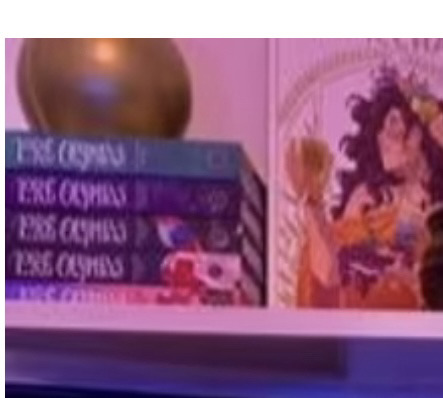
But then I watched Read with Rachel's "Did It Deserve 1 Star" review of Crown of Starlight and it cemented my assumptions and concerns regarding Cait's intentions and influences even more.
youtube
As a brief tangent, I've read A Touch of Darkness by Scarlett St. Claire. It very obviously is using Lore Olympus as its blueprints, but it's not super obvious that if you didn't read Lore Olympus or weren't aware of it, you probably wouldn't notice. It's still not a great book on its own, it's riddled with writing problems, but at least it can call itself its own thing to some degree.
Crown of Starlight is just blatant Lore Olympus fanfiction pretending to be original, even down to its marketing (which I'll get to shortly) but swapping out Hades and Persephone with Dionysus and Ariadne, and setting the entire story in space. Why is it in space? There doesn't seem to be any actual necessary reason for this, it just is, go with it. I'd be willing to accept this because changing up the setting of pre-existing stories can be fun (god knows I loved the premise enough of Lore Olympus being a modern day Greek myth retelling that I had to go and make my own version of it that's still in that modern setting) but as RWR says in her review:
"... we're told that it's the 'island' of Crete, but then we talk about commbands, airlocks, [holo-shields] and it wasn't really written in a way that I felt meshed 'Greek retelling' and 'sci-fi' in a cohesive way."
Needless to say, Crown of Starlight unsurprisingly suffers from the same problems Lore Olympus does, where it will try to "subvert" the original myths by changing their setting and characters and then doing absolutely nothing interesting with them to justify those changes.
To really drive my point home that Crown of Starlight is undoubtedly Lore Olympus fanfiction, Lore Olympus was literally used as a comparison point in Crown of Starlight's marketing which is a fair tactic to use to advertise to a specific niche or demographic, and while some have argued that Cait isn't technically the one to come up with that marketing jargon, it's made much more clear that she used that comparison herself when writing and pitching the book because it is quite literally just Lore Olympus with a different couple in space, right down to the main female protagonist being part of a purity cult. And of course it wouldn't be a bad Wattpad romance if it didn't have our main female protagonist Ariadne talking about how inconvenient her MASSIVE BREASTS are and of COURSE Ariadne is a poor innocent uwu babygirl who needs a man to come in and rescue her from the evil purity cult and of COURSE it hints at them eventually having raunchy sex just for it to wind up being milquetoast bondage and of COURSE it all just winds up taking traditionally queer characters and stories and turning them into this sanitized Disney-esque plotline where the boy and girl were always meant to be together and nothing else matters except their love-

And that, at its core, really just screams "this is bad LO fanfiction". From the stylization of the book's writing which never outgrew its "adorkable fanfiction writing" phase-
"Realizing that I'm being gaslit by my entire world doesn't make it easier to deal with, but hey, at least I still have some part of my soul!" - an excerpt from Crown of Starlight quoted from RWR's review timestamp 13:03
-to the "creative" choices made to turn Ariadne into a chastity cult girl whose resolution is obviously going to be to have what's implied to be dirty raunchy sex just for it to be like... the most tame level one bondage stuff;
-to the classic "she breasted boobily down the stairs" focus on Ariadne's body and breasts and sex appeal that's being kept in check by that pesky purity club.
And that's really disappointing because I had seen people say, "Yeah, Cait did an awful thing and deserves to be removed from her publishing schedule, but it's a shame that that book was written by Cait because it's actually a really good book!" because now it's just making me even more sus of people's Greek myth adaption recommendations (I'm still mad at BookTok for convincing me that A Touch of Darkness was worth reading). All I could think while listening to some of the excerpts quoted by RWR was that if I didn't know about Cait Corrain and read Crown of Starlight blind, I'd undoubtedly assume it was being written by a heterocis guy... but it's in fact being written by a queer woman.
And this is where I segue into talking about the root of this problem, where the calls are really coming from - Lore Olympus and its erasure of queer identities and relationships, despite also being written by a queer woman who should know better.
I could think of no better character to help carry this essay than Eros.
Unlike many of the characters in LO that Rachel has managed to straightwash by changing their motives entirely or straight up changing their identity from the source material (ex. Zeus, Apollo, Crocus who was turned into a flower nymph, Dionysus and Achilles because they're both literally babies, the list goes on), Eros has largely remained the same on paper who had zero reason to not be queer within the story.
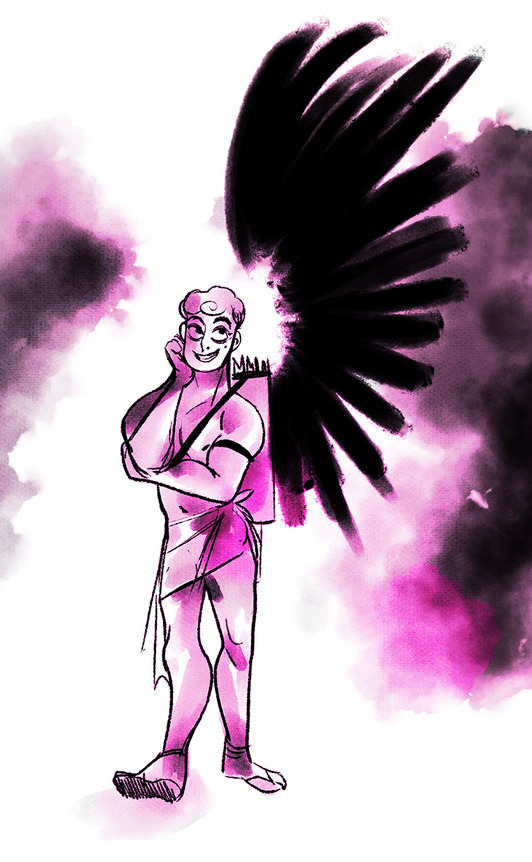
Eros is still the god of love in this, he's still a guy and presumed to be an adult, but we NEVER see or explore him having relationships with anyone other than Psyche, aside from a brief mention of organizing orgies in the beginning that's used as a quick joke and then promptly never mentioned again.
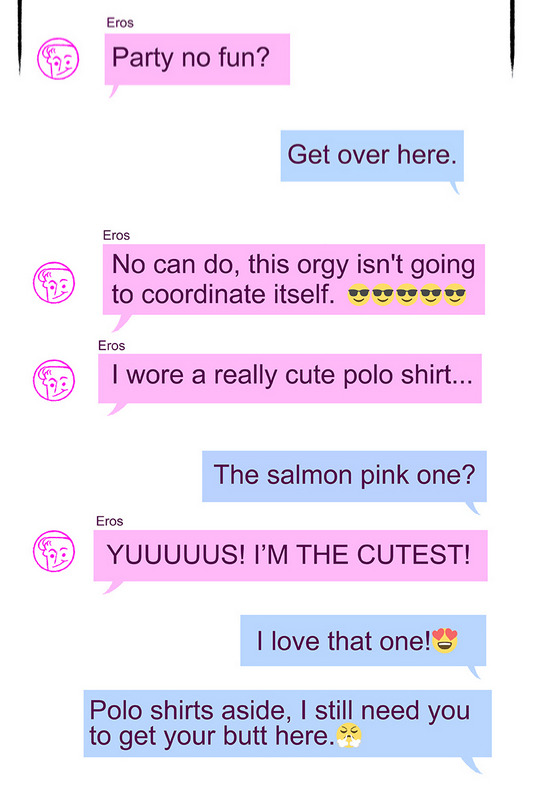
Just like with Crown of Starlight and A Touch of Darkness and all these other "dark romance" stories, it's that brand of "pretends to be sexually liberating but isn't actually" writing, where they'll briefly mention orgies or sex-related things and then beat around the bush or avoid involving them entirely like a kid at Sunday school who doesn't want to say the word "penis".
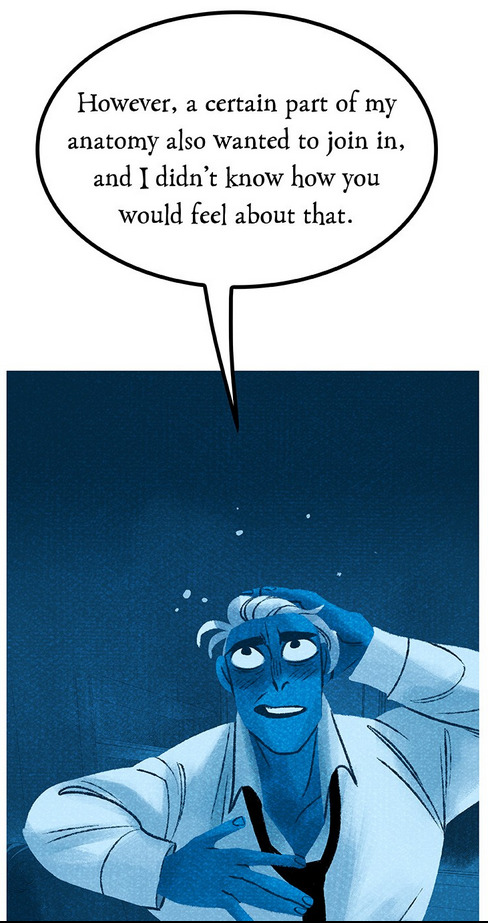
(fr out of all the corny and awful slang for genitals I've seen used in stories like this, "a certain part of my anatomy" is definitely one of the most boring and stupid, like for god's sakes Hades you're both adults and at the beginning of this comic you thought she wanted to bang in the kitchen, why are you suddenly talking like a 7 year old boy LOL)
All that aside, while Eros might still be hinted at being queer and sex-positive, it's only as vaguely as possible so that the story can quickly move on to focus on him and Psyche or, better yet, Hades and Persephone. When Eros isn't deadset on finding Psyche, he's being the gay best friend for Persephone, who he has NO right having a friendship with when he introduced himself by intentionally getting her as drunk as possible with the intent of dumping her in Hades' car as per his mom's command. It's brushed off later as "well Aphrodite maaade him do it, for Psycheee!" but Eros still agreed to potentially put Persephone in danger over a relationship that had NOTHING to do with her and was also mostly his fault in its fallout (which Artemis calls him out for, but of course, like all the other times characters have called out the actual issues in the story they're inhabiting, they get brushed aside so that Persephone can talk about Hades):
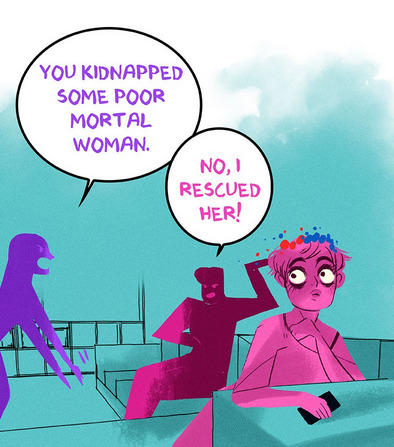
Now, the Eros and Psyche plotline is one I've talked about before here and not the focus of this essay so I'll keep this tangent brief, but it's absolutely wild to me that Rachel took a story about a woman going to the ends of the earth to prove her love for someone whose trust she broke (a common theme in a lot of Greek myth stories, such as the myth of Orpheus and Eurydice) and turned it into... woman of color gets turned into a nymph slave for Aphrodite to 'test' Eros, a test that isn't clear at all in what it's trying to achieve, and wait hold up, didn't Eros actually fail that test by kissing Ampelus while completely unaware that it was Psyche-
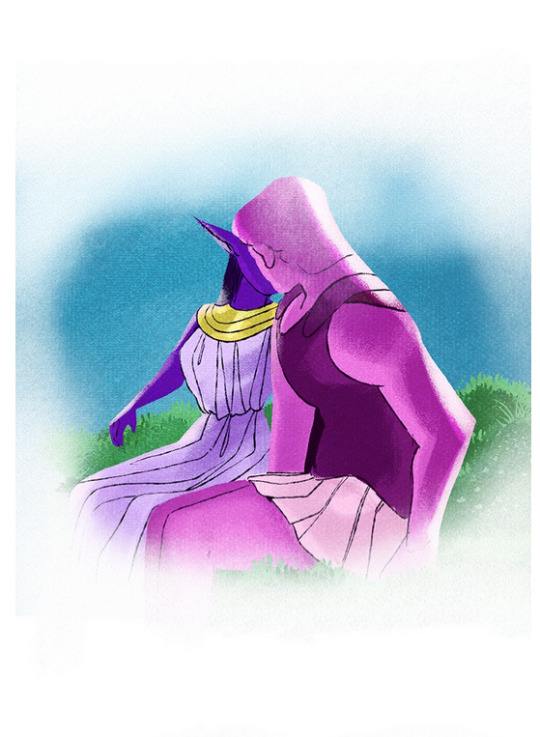
This is just that episode of Family Guy where Peter justifies emotionally cheating and eventually physically cheating on Lois because "well you were the phone sex lady the whole time so no harm done!", isn't it? (×﹏×)
youtube
Anyways. It's all very convenient that the comic will hint at queer rep just to either have it be a constant question of whether or not they're actually queer (ex. Morpheus) OR to have it be promptly swept under the rug to make way for other characters/plot points. It's like when mongie tried to be "inclusive" by writing a stereotypical vaguely Asian character with no specific ethnicity just to get angry at her fanbase for calling her out on this that you can't just call a vaguely Asian character "representation" of anything (because Asia is MASSIVE and covers so many different ethnicities and languages and cultures).
Eros is only as gay as he needs to be to fill the role of "gay best friend" for Persephone.
Krokos is no longer a male lover of Hermes but a flower nymph created by Persephone because... apparently we can't dare imply that Hermes would be into anyone besides his unrequited childhood love, Persephone.
Achilles is introduced as a baby even though it makes no sense in the comic's own timeline where Odysseus is presumably already a well-known hero in Olympus, so much so that he was invited to the Panathenea.
Apollo is turned into a flat-out rapist who's only concerned with getting Persephone at all costs and when that doesn't work, he tries to get ANOTHER flower nymph (Daphne) who's actually genuinely interested in him (contrary to the original myth, there's that "swap it subversion" Rachel is known for) to cut her hair so she'll resemble Persephone more because we can't have a single plot point not resolve around Persephone.
Despite there being loads of genderbent characters already, Morpheus is supposedly the only one we're supposed to assume is specifically trans and not just a gender-flipped version of a Greek myth character. Why? Not because Rachel stated so explicitly, not because the comic has actually explored her identity as a trans woman, but because the readers just assumed it in good faith and Rachel was clearly fine with taking credit for trans representation that's only there via assumption (and only confirmed via her mods in Discord, which is... not how you establish canon information in your comic, Rachel.)
Hestia and Athena are part of a chastity club, until uh oh how convenient that they're secretly in a relationship with each other even though it further vilifies them and their morals, particularly Hestia who was promptly called out for being a hypocrite for taking Persephone's coat gifted to her from Hades while secretly being in a relationship the whole time. Not only does the Hestia and Athena relationship manage to commit queer erasure - of two gods who are considered icons in the aroace communities - but it also makes the only two lesbians in the story come across as assholes AND ON TOP OF THAT ALSO manages to somehow invalidate queer sex and relationships as being legitimate due to the even deeper implication that breaking their chastity vows "doesn't count" because it's not a male x female relationship. It's the 'ole poophole loophole all over again.
And then there's Artemis, who has MORE REASON THAN EVER TO BE IN THE PLOT but keeps being conveniently ignored. Her finding out about Hestia and Athena doesn't get any more screentime than her going "oh you're in a relationship, okay" , we never see her question the true intentions of TGOEM or what it means to her, we never see her have any opportunity to carve out her identity beyond just being Apollo's twin sister (it tries to at times, but then immediately goes nowhere with it, amounting to just poetic word salad), and she really just comes across as what a lot of people assume aroace people to be - alone and standoffish, because obviously someone who's nice and a good person would be in a relationship, there has to be a reason they don't want to have sex or fall in love, and that reason obviously has to be that they just hate everyone and want to be alone forever (¬_¬;) Then again, like many of the queer characters in LO, I don't know if I can definitively call her aroace because it's kept as vague as possible, and - going by Rachel's answers to these questions way back in her Tumblr era - apparently people can't be gay and ace at the same time-
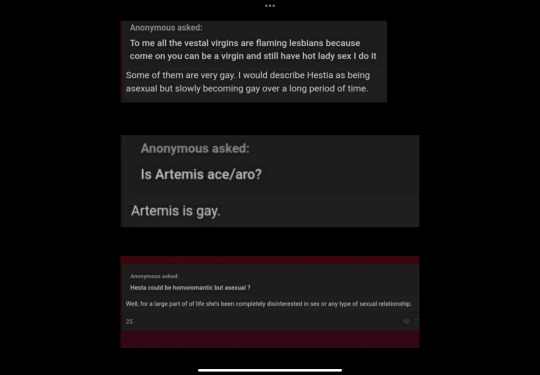
There are undoubtedly loads more examples that I could cover here but that goes for practically any essay I write about LO - the more you peel it apart, the more you start unearthing some really questionable and frankly mean-spirited stuff. Queer people feel largely ignored in LO, alongside many of its derivative offspring such as A Touch of Darkness and Crown of Starlight, and it really speaks to how so many people - queer women, no less - have somehow managed to bastardize and sanitize what were traditionally very queer stories with queer characters. It's like these people think "olden times" and can only get as far as "women were slaves and men were rich assholes". Like, yeah, okay, that was the case for many cultures, but not all of them, and for some of them it wasn't as clear cut as that, many had misogynist power struggles in them while also still celebrating women and queer people in their own way. Greek myth is full of stories of women being forced into marriage or being made the victims of assault, but many of them are supportive of women and their struggles, unlike works like LO that somehow manage to be less feminist and sympathetic to women and queer people than these works from thousands of years ago.
This is another topic that's surely meant for another post, but it really speaks not only to the straightwashing and whitewashing of Greek myth, but also the Westernizing of it. That's not to say Rachel Smythe and Cait Corrain and Scarlett St. Claire are intentionally trying to whitewash another culture's works here, but if you're raised predominantly on Western media, you're undoubtedly going to absentmindedly adopt ideas about society that are primarily molded around Western beliefs .
And this is apparent in LO, while Rachel is from New Zealand, you can tell she grew up on a lot of Western media and its influences are sorely showing through LO's worldbuilding, character designs, and narrative choices. That "modern setting" that I mentioned before is much less Greek and a lot more adjacent to The Kardashians which lends to the theories that most of the media that Rachel consumes is American. Rather than actually going to the effort of doing her research on Greek culture, she seems to just prefer defaulting to the easiest assumption of how modern society is across the board - a generic Los Angeles clone with big glass skyscrapers and pavement walkways. She rarely ever draws food or clothing from those time periods; despite this story being about gods she's spent so little time on the people who passed on the stories about those gods, the mortals, and the gods themselves rarely feel like gods, rather just like Hollywood celebrities covered in body paint. The clothing feels very generic and uninspired with often very little Greek influence, even though Greek clothing is designed around Mediterranean living which you could do a lot with, to such an egregiously Western degree that Hades and Persephone's wedding was Christian-coded. The food... well, there ISN'T any because as we've seen, like the stereotypical American child, Persephone apparently only wants chicken nuggies and Skittles for dinner, so we never see her eat; and not only do we not see Persephone eat, but Rachel weirdly tries to use Persephone's vegetarianism as some kind of anti-capitalist characterization when much of the Greek diet is predominantly vegetarian. It's NOT HARD or uncommon to be a vegetarian in Greece!
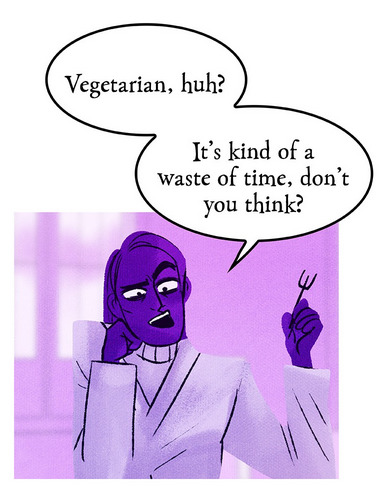
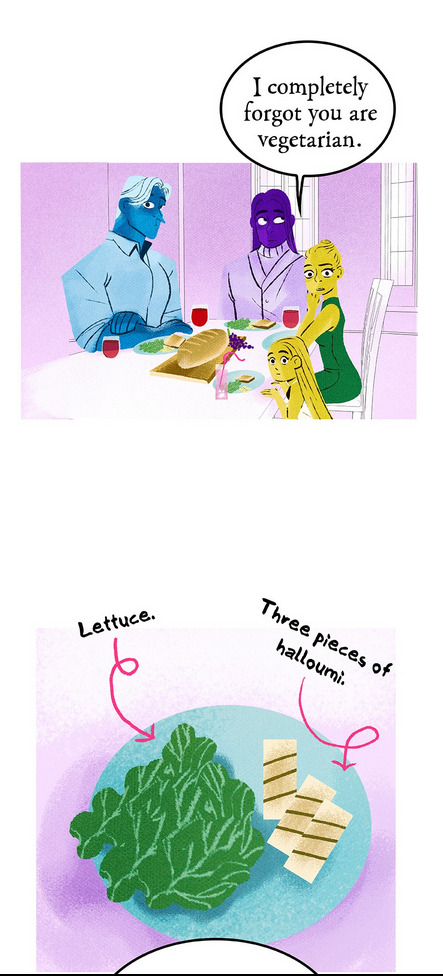
(it looks like they're literally all eating the same thing so IDK what Hera is referring to here, it looks like they're all eating toast and lettuce LMAO)
All that's to say, much of LO - and the books like it that I've gone over here - are written with this idea that every culture - including the one that it's trying to adapt - was subject to the same ideas that Western culture lives by in the modern day - that being a vegetarian is "counterculture" in every culture, that the notion of sexual purity is enforced in the same way it's enforced in the Western education system (cough Christianity cough), that queer or otherwise "unconventional" relationships should stay inside the bedroom and not be seen. As much as Rachel claims she wants to "fight the patriarchy" and "deconstruct purity culture", all she winds up doing is reinforcing it through a Westernized lens, which is, as I've talked about before, very indicative of right-leaning white feminism and what it embraces and promotes - being a "good woman" who follows the rules and willingly becomes part of the system that's oppressing them because that's what "good women" do. Women who are confidant in their sexuality are evil and should be shunned for being "sluts". Women who are in relationships with other women "don't count" as real relationships the same way heteronormative relationships do, and cannot be trusted because they're likely trying to spread an agenda that's designed to brainwash heterocis women. Women should only aim to achieve marriage and their entire personality has to be built around their true love. Women are allowed to be kinky, but only as kinky as roleplaying the exact same gender structures that puts the man in a position to dominate a woman, and it should always and only ever be with her first love who she marries immediately, no one else.
This is exactly what the critics are getting at when they hold LO - and its creator - accountable for the messages it's been sending for five years to its audience of middle aged women and young girls. Having a demographic is fine, if this were just a comic for girls it would be fine, but it becomes a lot more problematic when that demographic is being fed toxic power fantasy stories based on a culture that's being gentrified and sanitized of all its original messaging and characterization right before our eyes. It feels blatantly misinformed from the very beginning in its intention to be a "feminist retelling" of Greek myth, because somehow Lore Olympus manages to be less feminist than these stories drafted and written by men from 2000+ years ago.
I opened this essay with a question: why do we keep getting these Greek myth adaptations written by queer women that still wind up perpetuating toxic heteronormative culture?
I think cases like these really highlight how deep the heteronormative brainwashing from childhood onward goes. That, despite these writers being queer or women, still manage to reinforce the same ideas and tropes and harmful predisposed notions that were designed to be used explicitly against queer people and women. These are things that we can't ever stop challenging, and asking, and truly deconstructing, because it runs deep in many of us who grew up on popular media even as innocent as Disney. Learning about more complex social concepts like sexism and misogyny and queerphobia doesn't automatically absolve us of those very same biases that have been both blatantly and subtly ingrained into us since childhood. All that said, Rachel being bisexual does not mean she's not capable of straightwashing; Cait Corrain being a queer debut author with a POC main character didn't stop them from targeting other POC debut authors at their own imprint; being part of any minority group or identifier does not automatically protect you from perpetuating the cycle that you, too, likely had enforced upon you at some point or another in your life. The fact that these creators and writers are still perpetuating that cycle to begin with is indicative of why it's a cycle at all - it takes work to break on a subconscious level because those cycles are specifically designed to target and hijack the subconscious.
At its worst, do you really think Lore Olympus can claim to be a feminist retelling that's "deconstructing purity culture" when the creator herself admittedly never fully identified or understood sexism until her mid-30's and has the audacity to say her audience is "harsh" on the female characters that she constantly vilifies through her own narrative?
"I feel like female characters in general, people will be a little harsher on them and sometimes way harsher on them, and I used to be like.. before I started writing the story and like making a story I was like yeah, sexism is not that bad, and [now] I was like oh it's bad. It's quite bad [laughs], so like, I don't know, I feel like the female characters in the story don't get so much of a pass. But this isn't consistent across the board, it's not all the time" - Rachel Smythe, in an interview with Girl Wonder Webtoon Podcast
If Lore Olympus truly was just a series meant to be for fun "no thoughts head empty" drama and spice, that would be fine. I've said it time and time before on this blog and I'll say it again: I wouldn't have an issue if Rachel was just writing a story exclusively revolving around heterocis men and women. I'm just frustrated and tired and annoyed that she keeps lying about it, and doubly so that this comic and its creator who claim to be "feminist" have inspired other people in the same headspace to continue to perpetuate that cycle through works that are clearly inspired by LO and never challenged the things LO promoted - violence towards "unconventional" women, violence towards POC, and erasure of queer people. And worst of all, for writers like Cait Corrain, it's more than just writing a really bad book with really bad messaging, it's going so far as intentionally targeting those same groups of people that are regularly vilified in works like LO - people who are just existing, who don't pose a threat to anyone, but had the misfortune of becoming the target of a white woman's insecurity.
I don't know what the answer to this problem is. I don't know what form the solution will come in, if any, to address the ongoing issues with Greek myth adaptions that are being sorely written through an "America as the default" point of view and praised for "rewriting the script of Greek mythology", quite literally cultural appropriation happening live right before our eyes all for the sake of cheap entertainment. Maybe it'll take the failings of works like Crown of Starlight to really get people talking about it. But so long as the roots of these works - such as Lore Olympus - are still being protected and marketed en masse by the same kinds of people who don't see the issue in Americanizing other cultures and their stories, then Lore Olympus and Crown of Starlight will not be the last ones to cause harm to the source material - and the cultures that source material is born from and a part of - they're taking from.
I opened this post with a question, and I'm going to close it with another to really leave it as food for thought. That question comes from another video that I'll link here for you to watch at your convenience that spends even more time diving into and discussing the nature of works like this that have seemingly attempted to "deconstruct" the very dogmas that they still wind up reinforcing all the same.
Does the romance genre have a white supremacy problem?
youtube
(yes. yes, it does.)
#lo critical#anti lore olympus#lore olympus critical#cait corrain#a touch of darkness#crown of starlight#scarlett st claire#Youtube
398 notes
·
View notes
Text
Magic in Twisted Wonderland (non-UM, non-flight): Jamil
Kalim says that Jamil learned how to use magic before he did and would use what he practiced “to help the grown-ups” (Kalim’s other servants?).
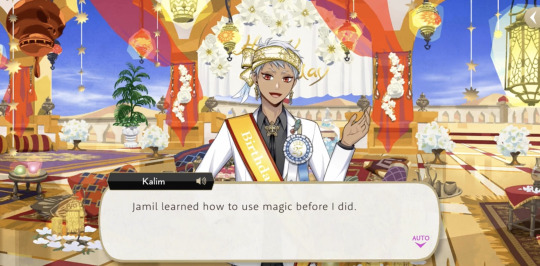
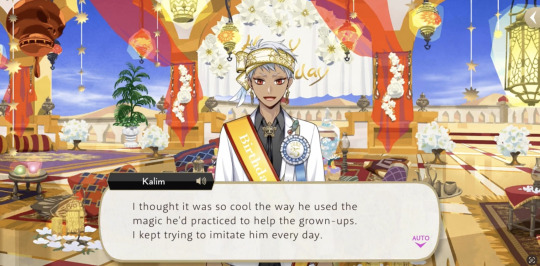
Jamil explains that he uses magic to braid his hair in the morning, saying that “It takes a lot of finesse to do intricate braiding with magic.”
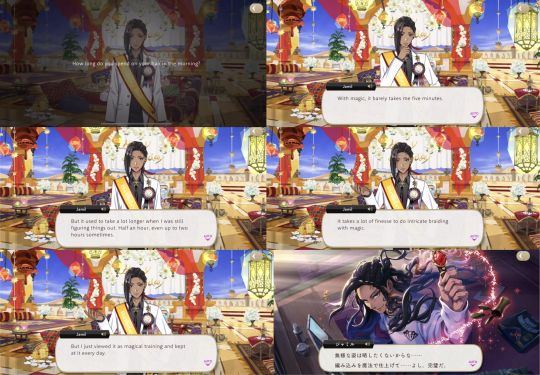
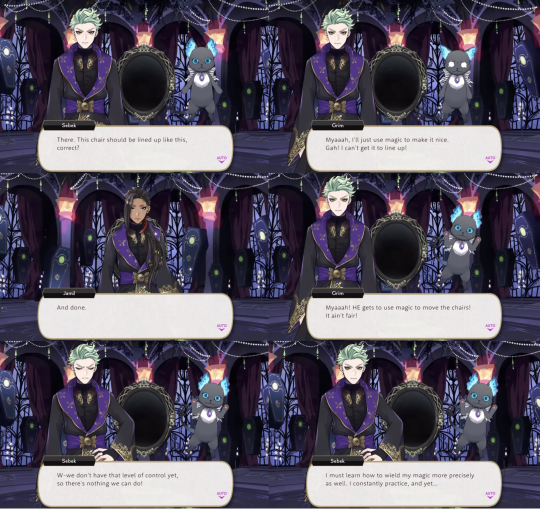
It is possible that, similar to Azul, Jamil is adept at precision magic: in addition to being able to use magic to braid his hair, we see him setting up chairs for an event with magic, which Grim and Sebek say they cannot do.
Sebek explains that they do not have that level of control yet, and must learn to wield magic more precisely, like Jamil.
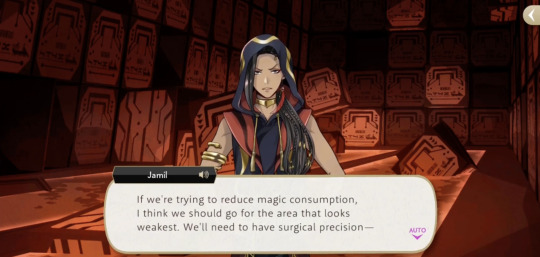
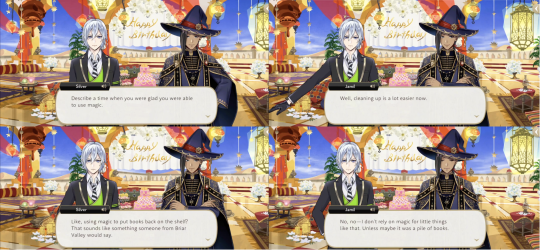
Jamil himself mentions using magic with “surgical precision” during Book 6, when attempting to reduce magic consumption.
When asked to describe a time that he was glad he was able to use magic, Jamil says that cleaning up is a lot easier with it. When Silver asks if he uses magic to do things like put books on shelves Jamil says no, and that he does not rely on magic for smaller tasks.
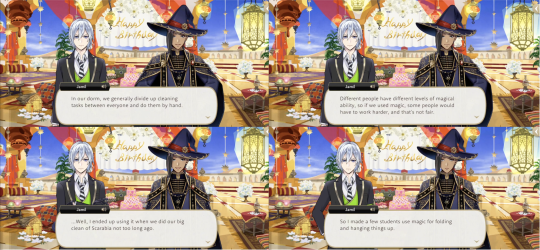
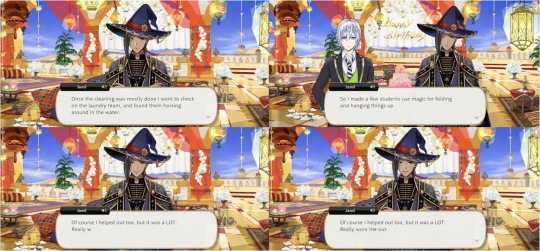
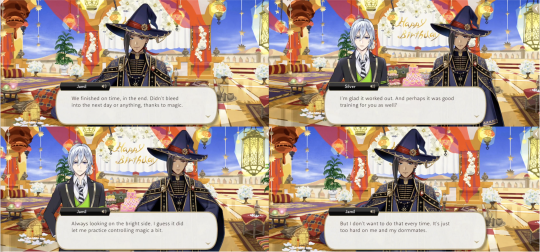
Jamil explains that Scarabia dorm generally divides up cleaning tasks for everyone to do by hand so that the work is fairly spread between all students, as different people have different levels of magic, but recently he did end up using magic for doing laundry: the laundry team, along with Kalim, who was supposed to be supervising them, had been playing in the water instead of performing their tasks.
Jamil assigned as many people as possible to hand washing rugs and cushions while asking others to use magic to fold and hang up laundry, with which he himself also helped. When Silver asks if it was good training, Jamil admits that it may have helped him practice control, which may also tie into his magical precision.
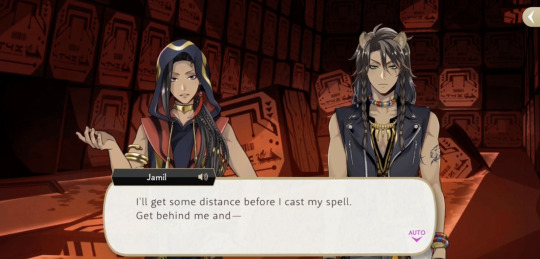
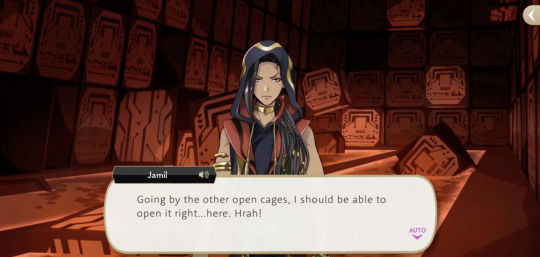
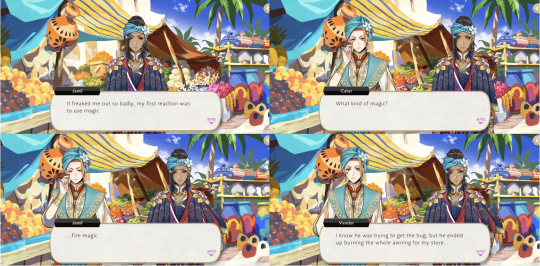
Jamil repeatedly uses an unspecified form of attack magic in Book 6 to open phantom cages, but he seems partial to fire magic. He tells a story of a time he was so frightened by a bug in a date he’d been eating that he set the market stall that was selling the dates on fire when he was young.
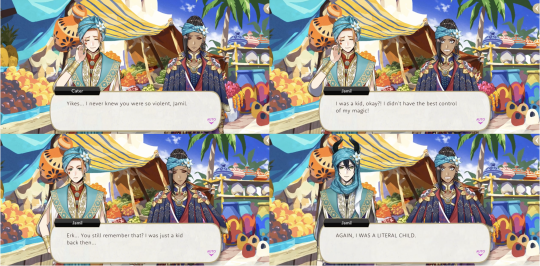
Jamil insists, repeatedly, that he was a literal child at the time and not fully in control of his magic.
When met with bugs during the Halloween event Jamil again decides to solve the problem by setting everything on fire.

He considers fire magic as a solution during Fairy Gala but vetoes it on the grounds that they would not be able to sustain such magic use for an entire night.
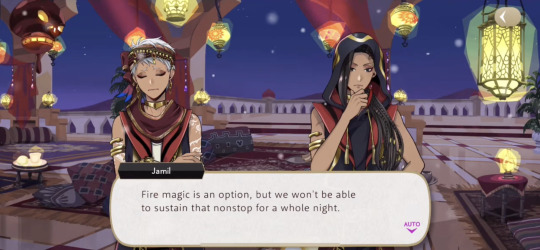
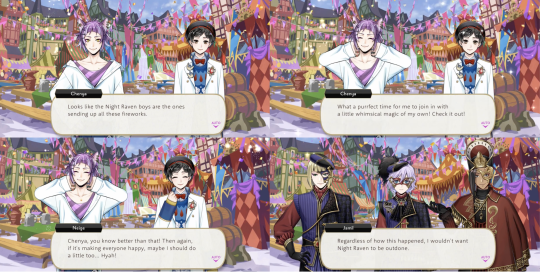
Much like the other Glorious Masquerade group members, he also sets off magical fireworks in Fleur City.
Jamil also uses wind magic, doing so to create a performance of flower petals and fabric for Crowley, and then to save Kalim when he falls of his flying carpet.
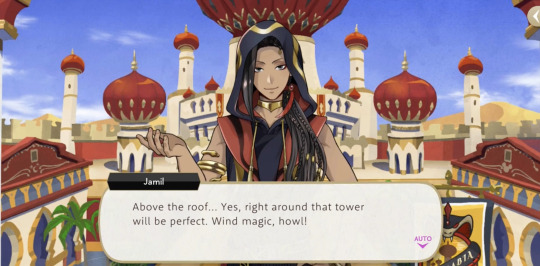
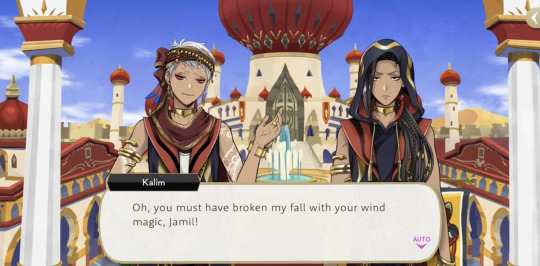
We have also seen Jamil make magic barriers at least twice: once to save himself, Ruggie, Floyd and Ortho during Spectral Soiree, and once to save Deuce from falling ice cream.
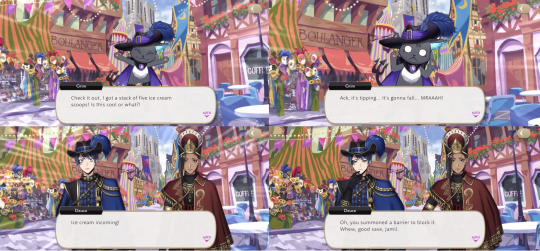
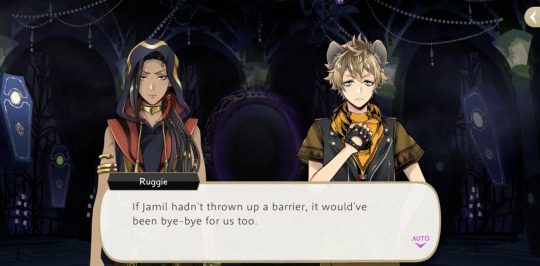
He uses magic to change his clothes, summon his magical pen, and conjure light in Book 6.
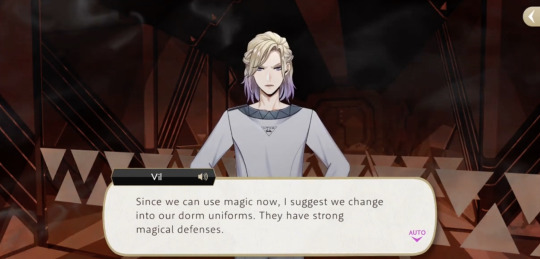

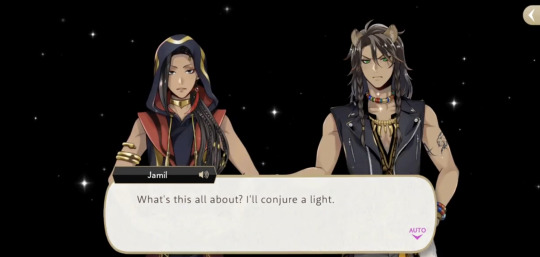
87 notes
·
View notes
Note
livvvv my rec goddess. i’ve recently developed an insatiable knack for draco doing little muggle things, like being obsessed with soap operas, or learning how to bake, or playing board games, or painting a house (??) etc etc. any recs as such perchance?? my eternal thanks x
Love this ask anon, “Draco in the Muggle world” can be such a fun trope! I tried to include a bit of everything but I feel like driving and cooking are very popular in fic, so there’s probably a lot of it here. I hope you enjoy these!
magic in the making by getawayfox (G, 2k)
I didn’t see Malfoy for a year after the trial. When Gin told me that, according to Pansy, he had opened a little posh bakery in Mayfair, I thought she was joking, so I went to see for myself.
Market Saturdays by iota (M, 3k)
In which Harry is an accidental part-time cheesemonger, Draco is an organic farmer and they fall in love.
Muggle 'Drug Store Items' by loveglowsinthedark (E, 4k)
Malfoy's interest is caught by a certain Muggle drug store item. (Hint: Flavoured Condoms)
To Make A Way by cavendishbutterfly (E, 5k)
When Harry finds Draco in the back row of the cinema, he doesn't mean to accidentally befriend him. Or fuck him. Or catch feelings. The thing is, Draco only does casual.
How We Throw Our Shadows Down by thistle_verse (T, 14k)
Draco has finally found the perfect, rare piece to complete his collection. The only problem is that the item belongs to Harry Potter, the last wizard on earth Draco wants to ask another favour from.
The Tapestry of Kinship by khalulu (T, 15k)
Harry is at loose ends, Draco is good with needles, and Draco's young daughter wants to see a certain tapestry repaired. The Noble and Most Ancient House of Black will never be the same.
Tuesday Nights by firethesound (E, 15k)
The absolute last place Harry expected to see Malfoy was in a rundown Muggle cinema on a Tuesday night.
Rich Friend by iota (E, 18k)
As far as Harry can tell, Draco Malfoy is still rich as hell. He’s just not a wizard anymore. Featuring: Draco Malfoy trying to make it as a Muggle pop star, Harry Potter as our confused and horny hero, bad driving, good music, and the mysterious magic of falling for someone.
Harry Potter and The Bisexual Awakening by Writcraft (E, 23k)
Harry is perfectly content being single, heterosexual and living in Godric's Hollow with his very clingy rescue dog, Snitch. When Draco Malfoy turns up on Harry's doorstep demanding that Harry teach him how to drive, things quickly become a lot more complicated.
I Bet That You Look Good on the Dancefloor by birdsofshore (E, 28k)
Harry felt lit up from inside as soon as he entered the bar. There were blokes dancing together, their bodies close to one another, not keeping a wary distance as Harry was always careful to do when he was near another man. God, he wanted this – wanted it so much he could taste it, a metallic tang of heat and desire. He suspected nothing would ever be the same again – especially when he saw who else was in the room.
Around You Moves by ignatiustrout (M, 29k)
Harry knew Draco was gay when he invited him to move in. He’s never had a problem with this. So why does he feel so weird about Draco bringing men home all of a sudden?
Faint Indirections by ignatiustrout (T, 30k)
Draco Malfoy is the last person Harry expects to turn up in Boston, Massachussetts. But now he's here, and he won't stop requesting books from the library where Harry works.
Open For Repairs by FeelsForBreakfast (M, 35k)
After the war, Draco works at a tv repair shop and Harry breaks things.
(Un)wanted by aibidil (E, 36k)
Ginny's pregnant, then she's not and Harry's single. Harry, again with no family, doesn't know what to do with this turn of events, or how to find a new life—post-war, post-Ginny, post-abortion—in which he belongs. He doesn't expect that life to include dancing to the Backstreet Boys with Hermione and Draco Malfoy. A story of finding belonging in the unexpected.
The Miseducation of Draco Malfoy by magpie_fngrl (E, 37k)
Zacharias Smith writes a tell-all about the D.A. Harry Potter and Draco Malfoy are not happy about it.
Take A Chance On Me by mintaminta (E, 40k)
There's a DJ on RareFM with a secret. Or: the one with all the ABBA in it.
Nights With You by The_Sinking_Ship (E, 58k)
Draco is mortified when moments prior to departing for the most anticipated destination wedding of the year, he is cruelly dumped. But when he learns that Harry Potter has, at long last, split with his horrible boyfriend, Draco is certain his luck has changed. Never a man to squander an opportunity for revenge (and what would probably be a spectacular shag), Draco vows to make Potter his for the weekend. Now all Draco has to do is convince him.
Salt on the Western Wind by Saras_Girl (M, 60k)
When the war isn’t quite as over as it first appears, a guilt-ridden Harry is sent to a mysterious safe-house. Among sandwiches, insomnia, and Mills & Boon, he discovers something quite unexpected.
Modern Love by tackytiger (E, 61k)
Harry Potter, of all people, knows that life isn’t always fair. And no one gets to be happy all of the time. But surely there’s something more—something better—than a rubbish Ministry job, and a lonely old house, and that feeling that everyone out there is doing a better job of living than Harry is.
Running on Air by eleventy7 (T, 75k)
Draco Malfoy has been missing for three years. Harry is assigned the cold case and finds himself slowly falling in love with the memories he collects.
128 notes
·
View notes
Note
Hi Jenn. Can I ask you some info about “cozy” mysteries? I’m part of a writers group and recently shared some details about the plot of my novel and others in the group keep throwing around this term in relation to my book. Thing is I’m not sure if what I’ve written is a cozy mystery. I mean, it sort of is but also not. It’s a murder mystery and it’s set in a cozy UK village but it’s also kind of dark, with themes dealing with grief and thriller elements. I’m also querying UK agents to start with before I query US ones and while it looks like the term is maybe international I’m also wondering if it’s more US than UK? My comps are Agatha Christie, esp her Poirot novels which I see some saying online are cozy and others saying aren’t cozy, plus modern authors like Graham Norton and Tom Hindle. I know I can ask some of this in my group but I’m embarrassed to as I don’t know if I’ve written a cozy or not or given it’s kind of darker, if I’ve just written a murder mystery. I know this isn’t your area but if you could help me I’d really appreciate it, thank you.
With the caveats that I don't rep adult mysteries, I don't really read adult mysteries, I don't know anything about the market for adult mysteries in the US *or* the UK, nor what terminology is in use for the UK since I am not in the UK? Uh. Sure.
In my opinion, there are four main attributes for a proper cozy.
A cozy mystery must:
Feature an amateur sleuth. In other words -- the main character's JOB is not to solve crimes -- they are not a cop or P.I. or FBI agent or forensic pathologist or whatever. They may be a reporter or a novelist or a little old lady who happens to have a passion for puzzles -- they may be a kooky barista or bookstore owner or chef or something totally not-crime related!
Have a charming setting. By that I mean, warm, cute, safe-feeling -- say, a village/hamlet/vicarage called Button-on-Twee with a delightfully quirky cast of characters. The kind of place you want to take a weekend vacation to. (Not all villages/small towns are like that. Plenty of REAL small towns are in fact impoverished and bleak -- that wouldn't be the case in a cozy small town). It doesn't HAVE to be a village, it could be something like a hotel, vacation resort, or on a large yacht or something -- as long as it's charming/lovely. If it is set in a city, it would be like a pocket-neighborhood within a city. Like, maybe there's a darling B&B and a brownstone full of chatty neighbors and pets on a street that has a kindly greengrocer and a bookstore etc -- and we stay in that little corner of town, far away from skyscrapers and dangerous bits. It would be much harder, IMO, for a cozy to be set on like, a remote and isolated desert planet or farm in the middle of nowhere with no neighbors or something -- those things are not cozy!
Be "clean" -- ie, no explicit sex or grisly violence on page. Obvs there may be romance/relationships, love/kissing, etc if you want, but it will be closed-door, ie, the actual uh... graphic bonking stuff may be implied but will not be shown. Obvs there may be murders, but think, like, the level of violence on Murder She Wrote -- MAYBE we see an assailant whack somebody on the head or something like that -- but when bodies are shown, they are rather discreetly presented, or are discovered off-screen. They aren't showing twisted bodies or guts and gore and maggots in eyes and whatnot, yanno?
Be comforting and satisfying. Like, idk, it's just a vibe. Though there may be murder and light mayhem and delving into some of the darker parts of the human psyche (after all, MURDER, hello!) -- and the reader may certainly experience SUSPENSE (how will our hero get out of this jam?!) -- they will not experience TERROR. The reader knows they are in good hands and that the problems will be satisfyingly resolved and the main character will be OK at the end. They should come away from the book feeling satisfied, with a smile, not upset or stressed out.
If your book ticks ALL of those boxes, you can deffo call it a cozy.
If it ticks 3/4, like, it's sorta borderline 4, as long as the vibe is still comforting, it still could potentially be a cozy, but at the end of the day: If you don't think it's cozy, that's fine. Just... don't call it cozy then! Call it a mystery and then describe it and put the comps and let people come to their own conclusions.
(FWIW, Miss Marple is an amateur sleuth whose books are mostly set in a small town or vacation destinations -- Hercule Poirot is a former cop and professional detective whose books are set all over the map, literally. So by my definition, Poirot books are not cozies. Marple books might be -- but I haven't read them, so IDK about the vibe!)
70 notes
·
View notes
Note
If the Semiaquatic Circus characters were in Here For Sweethearts, would they be class clowns? ;:) But seriously, what would they be like?
Class clowns...hehe. clever...
Capella: I imagine she has almost a komi-san dynamic going on. Everyone thinks she's really pretty and mysterious but really she's just a bit shy and socially awkward and doesn't really know how to interact with her classmates but wants to befriend them. Does moderately well in classes, but feels a lot of pressure to get high marks. Is exempt from participating in gym class from a request from her parents.
Pogo Gogo: Actual class clown. I think she may have a bit of a Susie-Deltarune dynamic going on where she intimidates her classmates but she's really just a big goofball who likes to have stupid fun once you get to know her. Also helps protect some of the younger kids from bullying.
Yoyo: A fine student, but also a bit of a smartass who thinks he knows better than his teachers sometimes. Like if his teachers tell him to follow a certain format for writing a paper he'll sometimes just write in whatever way he wants to because it suits the paper better to him. The kind of kid to say "If the teacher isn't here in 15 minutes we're legally allowed to leave, you know."
Savannah: Overachiever student, which often results in a lot of burnout for her. It doesn't help that she also tries to join clubs and keep up a good social life--so in any down time she has she's probably too tired to do anything but nap or just play on her phone. Most likely a cheerleader, and she's very good at it!
Clyde: Alright student. Struggles in a few classes but isn't really bothered by grades as long as they're at least around a C. Does football to try and keep active. Often writes letters home to his family as I imagine they're a bit traditional and don't do phone stuff very often.
Esmond: Fairly good student, and is very sociable and friendly with his classmates. Teachers regard him as a sweetheart who's always trying to be helpful. Part of dance club and art club--he likes to make pieces with a lot of glitter.
Darwin: To no one's surprise a really quiet student. Doesn't have many friends, but seems to be seen hanging out with Esmond a lot. Many think he joined the dance club and art club for Esmond. He does very well in dance, but in art it usually seems like he doesn't put much effort into his pieces. Or maybe he's just...abstract?
Vis: Has difficulty making friends outside of their siblings, but seems to be trying to be more open to it. They really enjoy music class and have recently joined the music club in hopes of making new friends and learning how to play an instrument!
Nana: A student who seems to have an interest in art and literature!! She can usually be found reading books in the library when not in class. She seems to have a thing for short, spooky stories. Her and Mary would probably get along well if they were able to meet in HFSH.
Bonus!:
Furnando: Incredibly shady student. Does well in grades but staff doesn't trust him, he always seems to be up to something. He's probably a bit of a "black market dealer" for the school in a way, selling things to his fellow classmates like test answer keys or cigarettes or other generally-not-allowed-on-school-premises items. Flirts with the people who have a problem with him
#semiaquatic circus#here for sweethearts#hfsh#capella#pogo gogo#yoyo#savannah#clyde#esmond#darwin#vis#nana#furnando#ask
26 notes
·
View notes
Text
Most of the way into a bottle of wine, sad that once again we lost a real chance at exploring polyamory in mainstream media*.
I want to speculate for a bit on what the intent of the final episode might have been, in the case where they weren’t (apparently) censored.
We KNOW that (the) Doctor Odyssey (writers room) LOVED direct parallels. Every character treating or dealing with a patient revealed their own internal truths.
Max saw in Ken a superficial hedonism that belied a deep seeking of self expression and understanding
Tristan saw the older cancer patient and her younger lover and saw his own relationship with Avery (and Max) — she was leaving at the end of the season, he potentially has a terminal illnsss
Avery dealt with the castaway woman who despite all odds survived to reunite with her husband
So what were the initial writers and casting directors looking for when they cast for 1x17-8? What parallels were they exploring?
Captain Massey’s is easy, as I don’t think they modified his much — that’s why his parallel still felt like the real Odyssey. The couple organizing the weddings weren’t right for each other, they worked together as business partners instead of romantic partners, so they’re getting a divorce. Massey shouldn’t mourn the loss of a romantic entanglement, and he gets to keep his ship. Easy.
Tristan’s is also pretty clear, when you cut away all of the pro-natalist bullshit that they replaced his actual plot with. (He was with the racist cryptic pregnancy and the midwife.) PARALLELS: Love can come from unexpected places. It is possible to care for people who you do not expect to be compatible with. Reacting poorly because of a romantic loss doesn’t make you irredeemable, as long as there are loving people who are willing to support you through the pain. You have to work on your own bullshit in order to be a better person, but lashing out, even multiple times, can be forgiven if you put in the effort. Sometimes unexpected love is hard work, but it’s worth the effort.
Max was with the talkative coroner. His is slightly harder to understand. (Potential) PARALLELS: the things you have identified as obstacles to your love life may not be insurmountable. (Max seems to think that his biggest problem is the running away thing, when it’s actually the “expresses his feelings as orders” issue.) Your tendency to interfere with others actually comes from a deep love. (The coroner wants to connect with people, even those he cannot reach — the dead, the non-English-speaking market seller; Max dispenses advice and mandates when he wants to show that he cares.) Pursuing your partners’ interests may result in relationship progress, even if it feels like a disaster at the time. (The coroner doing the hike and dinner and having it rained out parallels Max attempting a threesome with his poly love interest and the ensuing relationship drama.) Earnest attempts to communicate, however bumbling, can still have good results. (The lackluster Spanish resulted in human connection AND effective acquisition of medication. Max’s intent to communicate his needs with Avery being met with her frustration WAS more of a her problem, not a him problem, in the finale.)
Avery was with Dr. Aaron Samuels. Hers is the hardest to parse. Most of his time that was left in the episode by the time the finale aired was just exposition for the Max shit above. Potentially: he is a psychiatrist, which means he has an MD but doesn’t have much recent experience. He is a potential mirror to her future, as she may spend the next 2-4 years studying instead of practicing medicine? Maybe he wasn’t her parallel? The next option is the guy who went out of his way to go get his new stepdaughter’s book because it was a gift from her dad … except that was also made into a TRISTAN plot about how going to extremes to express your love can be dangerous, but ultimately fruitful, and how non-traditional arrangements can still be as loving as traditional ones. I feel like Avery didn’t GET a parallel patient for the finale, which may explain why she didn’t feel like she was learning anything or going anywhere???
Obviously, the finale sucked ass. It was awful. We only got HALF a scene that had ANY of the Odyssey magic (the “I would stay with you both forever in paradise” discussion, which they had to temper by MOVING TRISTAN A FOOT AWAY AND HAVING HIM CALL MAXAVERY CUTE 🤢🤮). But I feel like the bones of a good episode were there, they just didn’t get to actually make the episode they had intended. This was a drunken attempt to reconstruct the episode that would have made SENSE based on how the show used to work before 1x08.
*I also want to take a moment here to mention that calling Doctor Odyssey “queerbaiting” is bullshit. The secondary love story in the two-part finale was LITERALLY a gay couple. You children don’t have the capacity to realize how MUCH things have changed, that a gay wedding as the direct parallel to the main love story of this show was so uninteresting that the direct interference of the network barely noticed it. The plot that DID make it through was “Max/Avery, a heterosexual couple, should aspire to be as in love as these two gay men”. When I made this tumblr account, that would have been IMPOSSIBLE as a plot on network TV, and now it’s the LEAST progressive route this show could have possibly taken. The show didn’t queerbait, it queer-delivered. Unfortunately, the gay shit wasn’t the plot we were actually promised, and they UTTERLY failed to deliver on the poly shit.
#doctor odyssey#ody3#two things can be true#I’m so sick with the loss of the potential this show had in the beginning#AND#the fact that the main plot of the final episode was a straight couple being held to the standards of a gay couple would have bee#n unthinkable a decade ago#mostly I haven’t seen people say Odyssey was queerbaiting but I HAVE seen it enough that I need yall to know that the queerness wasn’t bait#(I also don’t want to believe that the poly shit was bait but I’m also not ready to go full ‘facism destroyed my TV show’ yet)#(two things can be true)
34 notes
·
View notes
Note
Do you write? Where can I read something you wrote? :)
I'm really bad at updating my CV so I'm forgetting a lot of stuff but I wrote for most of the main "gaming news and journalism" websites during the 2000s and also worked on Unhallowed Metropolis the TTRPG in a bunch of roles, including a chapter in the soucebook. one of the more recent ones was Headcase which was an anthology by Oxford Press, which was an honor, i think it was about queer mental health? also my book Problem Glyphs has an essay in it, that's sold by Strix (publisher). I had some stuff in Thick As Thieves in Seattle that I was proud of but fuck that paper it was run by a psychopath. uhhhh I unfortunately started a short fiction series with Warren Ellis way before all the reports about him came out, called Deep Map Pilots, I think some of that is on this blog and searchable. Cafe Racer Anthology about Dune called Dune, I'm not sure if it's searchable or purchasable. I was in Lightspeed Magazine's special issue (or maybe it was another anthology) called Queers Destroy Science Fiction. Short story in Conclave Journal's 2010 or 2011 issue.
i'm a shit promoter of my writing honestly it's not really something I have been actively pursuing recently because it pays peanuts and I just haven't felt like writing as much as pursuing other stuff. i really only publish when someone asks me specifically or contacts my business manager lol. I've been thinking about trying to find a publisher for a poetry chapbook I've already completed and formatted but the poetry market is...well it's exactly what you would expect. borderline impossible to publish, much less sell, unless you have some sort of brand name going in, which I do not, at least in a way that would help sell poetry.
i started a short story I really liked based on the Clarksworld published list of "most common words used in titles of stories submitted to Clarksworld Magazine" more as a joke than anything but I've been thinking about cleaning it up and submitting it. it was kind of an exercise in "how do I take these extremely worn out title words and do something I think is fresh with them" and sort of as a little joke to submit to them. i think it's probably something they would maybe consider printing if the issue was right for it, I'm not sure though.
81 notes
·
View notes
Text
I don’t think there’s a single book BookTok has promoted in the last couple years that’s turned out to be an actually good “you cannot miss this read” which now makes me and so many others I know avoid it as a whole.
A lot of BookTok books seem to be specific for very young or very new readers who haven’t cut their teeth on fanfic or haven’t been reading from a young age. The writing style is either a really profound Instagram metaphorical caption kinda overwrought and over flowery language, or it’s trying so hard to be edgy and sardonic and ends up being completely tell and almost zero show. This Is How You Lose The Time War is a PERFECT example of this - where the flowery and poetic language actually takes AWAY from a scene and distracts you from it rather than adding anything to it in the moment, and for those who do like poetic fiction this will be up their alley but if you don’t and you pick it up because of badly marketed hype when you normally wouldn’t, it’s gonna turn you off reading in general!
There’s nothing wrong with starter fiction to help get readers engaged and then find their way into actually good books, but my gripe is that it’s never ever marketed as that and as if it it’s just generically good fiction. Nothing Colleen Hoover has ever written is objectively good - the writing style is mediocre and she romanticises taboo topics which will seem spicy to the average population who doesn’t READ. And yet she takes up every bookshelf which I promise you will end up turning many readers who ARENT on booktok away from reading altogether.
YA is another genre that has declined a lot in recent years because it’s full of marketers trying to fit all the buzzword tropes into their books and getting young readers to buy it because it’s “enemies to lovers pirate cyberpunk found family” or whatever - and it feels more like focus group fiction rather than actual writing. I LOVE YA but nothing that’s been released post 2020 has had any depth, plot, character development or any style to it.
A great example is Fourth Wing by Rebecca Yarros - i tried reading 2 chapters as a sample and it was shocking to see how illogical, overdramatic, overedgy and exceptionally “this happened then this then this then that” it was. There was absolutely zero nuance and it felt so “I’m telling you all this but I’m not gonna prove any of it”. And yet it’s rated either 5 stars or 1 star. I’m sure it’s a great starter middle grade/teen book but it is definitely not deserving to be on the same pedestal as other YA books like Hunger Games or Six of Crows. I used to think that perhaps I’ve just outgrown YA but considering I can pick up YA from 2018 that I haven’t read before with no problems, it’s so specific to BOOKTOK YA.
It’s getting to the point that if I see a book that’s being overpromoted on tiktok, I’m more likely to believe the bad reviews because there hasn’t been a SINGLE book where I’ve disagreed with them, and then go find a different book in the same genre that hasn’t been on booktok - it’s getting hilarious actually that the books that are actually incredible get zero screen time and traction on booktok because they aren’t just cheap easy airport reads. Once again - nothing wrong with an easy airport CH book or YA book, but we aren’t going around parading a Lee Child book as peak literature no matter how enjoyable they are.
I don’t even have a conclusion to this entire rant - I’m sick of books like Babel getting steamrolled because it was “too sad or too hard” in favour of the latest SJM book, and getting even more sick of the decline of media literacy due to books getting easier and more spoonfeedy. When they aren’t? They mistake flowery metaphors for complexity and depth.
#booktok#books#bookblr#Rebecca yarros#fourth wing#colleen hoover#this is how you lose the time war#Babel#rf kuang
446 notes
·
View notes
Text
Home: Terry Silver x Reader

Tagging: @volumesofforgottenlore@kmc1989@somethingdarkside17@noonee333

The house where Terry lives changes subtly throughout his relationship with you. The dark, masculine paintings he used to favour are put into storage one by one, replaced with artwork that you’ve chosen together. Brighter pieces, with vibrancy and colour. A warm plush blanket appears on the back of his couch because you get a little cold in the evenings. His wine cellar begins to feature rosé, when it’s only hosted reds and whites.
He spends Sunday mornings at the farmer’s market where he buys seasonal wild flowers. He sets them in a vase he’s never owned until recently, placing them in the centre of the dining table where the two of you eat because he knows you like how pretty they are.
He starts to cook again. Once a week he sends his personal chef home and the two of you spend the evening cooking together. It gets a little messy but it’s a lot of fun, he loves the domesticity of washing the dishes in the aftermath. He can’t keep his eyes off you as you raise up on tiptoes to put things away.
Photographs begin to appear on the fridge, polaroids you’ve taken throughout the course of your relationship. You’d been thrilled to find the camera when Terry was making some space his closet. It’s an original from the 80s. He’d spent the evening cleaning it up for you, showing you the intricacies of it.
“You should keep a few things here.” He had said as he shifted around his clothes and a couple shoe boxes. “It’ll save you coming and going so much between here and Silver Lake.”
He’d stayed at your apartment a couple of times in the beginning. It’s tiny, although bright and airy. The whole place could fit within the confines of his living room. You’d been embarrassed but it had felt more like home than anywhere he’s ever lived. The only problem was the bed, he’s over six four, he doesn’t quite fit, which is part of the reason you spend most of your time at his place.
That night you’re curled up on the couch together, your head resting on his shoulder as you read the latest Karin Slaughter book. He’s flicking through Casino Royale by Ian Fleming, it’s one of his favourite books. He has the whole collection of first editions on his bookcase in the study.
“You are going to give yourself nightmares, reading that this late.” He reminds you with an amused tone in his voice. It’s happened before, if you read something too spooky or violent before bed. You have a vast imagination, one that he envies but sometimes it can work to your detriment.
“I know but it’s too compelling.” You tell him, closing the book and setting it down on the coffee table before you tuck yourself in against him. Terry sighs contently as he sets his own book down, his cheek coming to rest upon the top of your head.
“I’ve been thinking that maybe you should stay.” He says quietly as his fingertips doodle light patterns over your bare arm.
“I am.” You remind him, your palm coming to rest on the space where his heart resides. “You have me until tomorrow morning.”
“No my love.” He whispers as he tips your chin up so he can meet your gaze. “I mean you should come live here, with me.”
Love Terry S? Don’t miss any of his stories by joining the taglist here.
Interested in supporting me? Join my Patreon for Bonus Content!
Like My Work? - Why Not Buy Me A Coffee

79 notes
·
View notes
Text
The DnD Lore Problem - Accessibility and Characters (and how BG3 might not help)
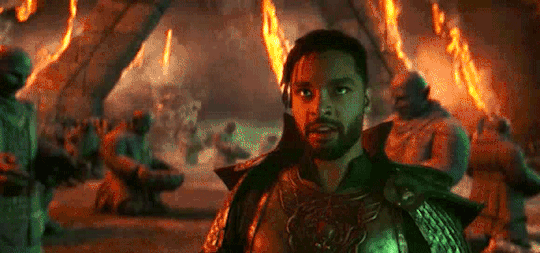
You know what? I am gonna talk about DnD Lore and the accessibility of that lore. I talked about this exessively before. But to summarize that long blog very shortly:
Wizards of the Coasts currently makes the mistake of putting basically most DnD Lore behind a paywall, rather than offering official ressources. This leads to a lot of tables actually playing with their original worlds, rather than Toril/Faerûn, which in turn also means, that they are not spending money on official products. While my anti-capitalist ass things that the lore should be accessible just so that people can enjoy it, I also think that this inaccessibility actually costs WotC A LOT OF MONEY.
Today I want to talk about another aspect of this inaccessibility, that is kinda linked to some of the stuff I talked about before, but also is linked to the things WotC is currently not doing in terms of both Honor Among Thieves and Baldur's Gate 3. A thing, that also might not quite work with BG3, though.
See, the core problem of this inaccessibility is, that a) there is no official place where you can just get base information about the world and the timeline, b) this world has grown organically for about half a century, which lead to clutter, but also to the fact that things are at times showing their age.
I might actually make a post on the gods and religion in the world at some other point - but for now let me talk about something else: Extended universes and access points.
The Problem with Extended Universes
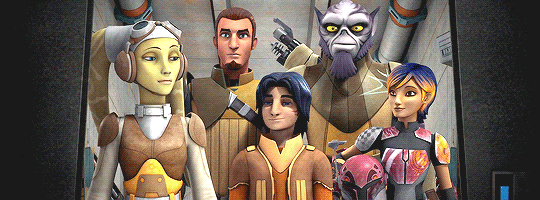
Okay, let's talk about how a lot of the big franchises for the longest time have told their meta stories - including DnD - and how it kinda struggles to find its audience. The extended universe.
I am frankly not entirely sure what franchise has started this. I am assuming it was Star Trek? But that is just a guess. But at some point in the 60s oder 70s someone had the idea that: "Hey, we could totally give the fans more to chew on by making official tie-in comics and novels!"
And that was how it worked for very long. Like a lot of the big franchises had at times around 10 novels and comics (if not more) releasing per year that would just explore other parts of the universe and allow the very engaged fans to... well, learn more about the world. Now, I am not going to talk about all the drama connected to the Star Wars stuff, but if you know, you know.
DnD did this too. (As did a lot of the big TTRPG systems, like Shadowrun and WoD as well.) Having a lot of tie in stuff - in the case of DnD mostly novels - that told more stories on the world and also established like some big player characters within the world. Elminster Aumar is probably one of the best examples here.
Those established some characters that play a big role within the world and also told just more stories of those big world changing events. In the recent DnD history that would be stuff like the Time of Troubles, the Spellplague and the Second Sundering.
Now, here we have one big issue. And one issue where I am not entirely certain where it arose from. But the fact is: In recent years, people invest way less into those kind of books. This is just a fact.
It is the reason why those big universes went from publishing like ten novels a year to often not more than three. We saw that in the failure of the extended Universe Disney tried to pull off for Pirates of the Caribbean (though I will still maintain that another big problem was that they barely marketed that at all - hi, everyone, who did not know there were extended universe novels for PotC). We also saw that with League of Legends, who really, really tried to tell a lot more stories with short stories and then also some novels set in Runeterra, before finally giving up, because most people didn't care.
In terms of Dungeons & Dragons I can totally see that a lot of people will also say: "I do not care what some other people's characters do within the world." Buuuuuut...
Stories actually can help you understand the world. Which brings me to...
The Elminster Problem
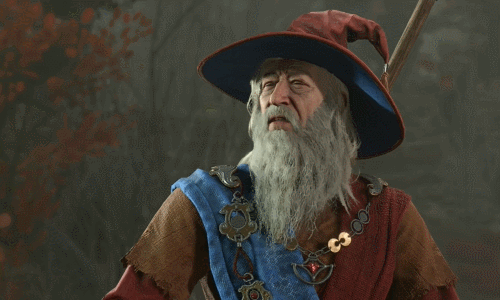
Okay, I do not know how to put this, but... If you look at the novels coming out for DnD literally half of them focus on either Elminster Aumar or Drizzt Do'Urden. Characters that have pretty much been around since the very beginning and. Look, I don't know how to put it but... It shows.
I am currently reading some of the newer novels and the fact is, that they do not really feel like fantasy books from the 2010s and 2020s. Because Elminster and Drizzt are very clearly characters originating in a very different time when stories were told very differently.
I mean, just look at Elminster. He is a wanna-be Gandalf character. He is from the early, early days of fantasy and... Look, I personally just really am unable to identify with a character like this.
And while Drizzt is a bit better as a character, but even he... How to put this delicately? They are both very much characters written by white cishet men for white cishet men. There, I said it.
I am noticing this a lot with reading Salvatore's books currently. Like, female characters are not overly sexualized, which is a plus. But they also very much exist most of the time in service to a man or at least in relation to a man. There is not a lot of female characters running around that have their own agency.
Which kinda leads to another thing. I actually saw this one brought up by one of those very cliché nerdy Youtube channels talking on DnD, who recognized the problem as well: There are basically two large groups of DnD players who barely intersect. One is the cliché nerds, the other is a largely queer and largely diverse group. And the youtube guy, who was very in the white cishet nerd group, suspected that actually the later group makes up more of the player base by now.
Buuuut... that is also the group who really do not get catered to by the canon lore so far. That was until 2023 with DnD:HAT and BG3 - both catering actually a lot to those groups.
Honor Among Thieves and the undermarketed books
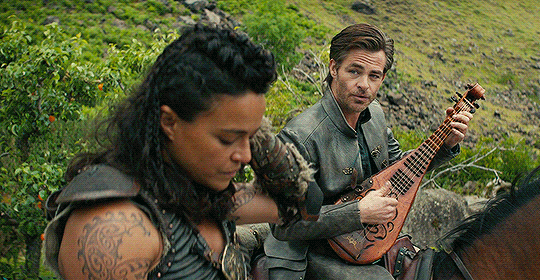
Okay, here is the thing: Honor Among Thieves had two novelizations (one for young readers, one for older readers) and two tie-in novels. One featuring Edgin, Holga, Forge and Simon before the stuff with Sofina went down. And the other featuring Simon and Doric taking place at the time while Ed and Holga are in prison.
I am honest: I really, really liked the Ed and Holga novel. It was super cute and charming and really gives a better understanding of the characters.
But of course once again there is the thing: The books - just like the Pirates of the Caribbean books - were super undermarketed. Like, most people I know off do not even know that there were books released. Heck, even within the actual active fandom there are again and again people who will be surprised that those books exist.
And... I actually also think that the books waste one big ass opportunity, by not at all tying into the broader lore. They are super self-contained.
And that is actually just a waste. Because the place were Edgin lived in? Yeah, that place was super affected by the Second Sundering. Heck, that might have had to do something with his troubles.
Why is that an issue? Well, because... there was not a lot going on there that was inviting you to further interact with the world and learn more abotu what is happening. For once, again, because I think it is a super fun and interesting world. But also, because... WotC wants to make money and is so bad at it, that it really boggles my mind.
See, here is the thing: They could've used those characters - that really are fun and sympathetic characters - to create an accesspoint into that world.
Alright, so what about Baldur's Gate 3?
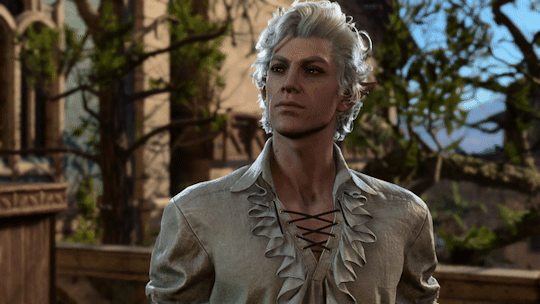
Which brings me to Baldur's Gate 3 and the thing that a lot of people have noticed: The other Baldur's Gate games - as well as some of the other games releasing around 2000 - had their own tie-in novels going into the characters, their background, but also what they were doing in the future.
Something that so far BG3 has not done, which some fans have already critized. Because a lot of people have actually gotten really invested into those characters. A lot of the kind of people especially who so far are underserved by a lot of the tie-in stuff: Queer and generally diverse audiences.
Like, I think there would be a lot of people, who totally would read a novel, about...
Astarion getting drawn into some sort of political intrigue in Baldur's Gate while serving Cazador
Karlach's time in Avernus
Some Adventure Wyll got dragged into while being the Blade of the Frontier.
Shadowheart going onto a mission for Shar (maybe together with Nocturne)
Whatever Gale was doing during the Second Sundering
Lae'zel's youth among the Githyanki
The Dark Urge and Gortash starting up the entire conspiracy
... whatever Halsin had been up to in his long live
Heck, people would eat that stuff up. And you could not only use it to worldbuild but also once more create some access into the world and what happened there. And they are kinda wasting a lot of potential by not bringing out those novels.
Of course, there is one big problem: BG3 makes it kinda hard to write about anything happening after the ending. Because as it is right now, someone is gonna be pissed if a novel set after the game does not go with the decision for a character they go for. Like, Ascended Astarion fans are gonna be pissed, if they go with Spawn Astarion - and the other way around. Same goes with every other character where you have those big decisions happening.
This is something they will have to tackle eventually if they plan on doing something with the characters in the future (no matter if we are talking Larian or WotC), but it is definitely an issue that just arises from the structure of the game.
Bonus of course is, that you just cannot define a canonical Tav. But without a Tav, you also gotta act as if the story of the game happened without a Tav, which still is not ideal. I am honestly not sure with how they are gonna deal with this on the long run.
Access via Characters
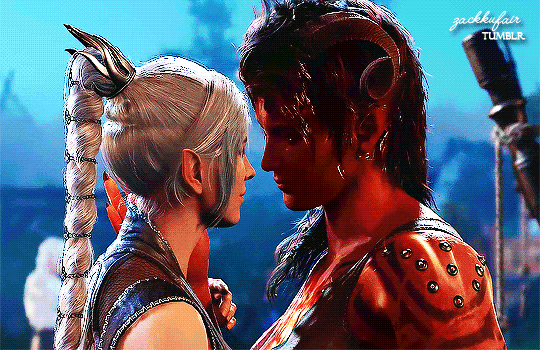
Alright, but what is the actual issue here?
Well, basically there are two hurdles to overcome for the accessibility of the lore. The first is the physical accessibility - aka, what I talked about in the last long blog post. The second meanwhile is more related to making the lore engaging. And that happens through characters.
It is for me what happened last year. I actually tried to engage with the lore as the movie came out - but only when BG3, that tied a lot more into the actual lore was released I actually found proper access to the lore. Because I had concrete things I could now look for because the game hinted at so much both through characters and major story events happening.
Here is the thing: If you just have the lore on its own, it is about as engaging as reading a history book. Sure, as your local history nerd I find reading history books fun, but most people really do not want to read a history book to engage with a hobby.
People will however engage with stories and characters that interest them. Which is where we get back to the thing I talked about at the beginning: Right now most canonical novels and stories still cater to an audience that is male, cishet, white and also, let's be frank, definitely over 30 years old. Leaving behind a lot of potential fans that theoretically make up a big part of the player-base, but actually do not engage a lot with the lore for this exact reason.
Look. DnD right now is fairly close to being an actual mainstream hobby, due to the recent proliferation of formerly nerdy stuff. And yet WotC is bleeding money, especially in regards of DnD.
If you ask me, sure... DnD should go into public domain. But it doesn't. And given that there are so many creative, skilled people working on this - no matter how dumb Hasbro is and how shitty of an employer they are - I actually do want them to succeed. I have really become engaged with this world now. And I think it is a pity that they clearly do not know how to market this stuff.
#dungeons & dragons#baldurs gate 3#dnd#baldur's gate 3#bg3#dungeons & dragons: honor among thieves#honor among thieves#dnd:hat#tie in#novels#dnd lore#accessibility#astarion#karlach#shadowheart#wyll ravengard#halsin#gale dekarios#lae'zel#elminster#drizzt do'urden#edgin darvis#holga kilgore#wizards of the coast#wotc#star wars#league of legends
157 notes
·
View notes
Text
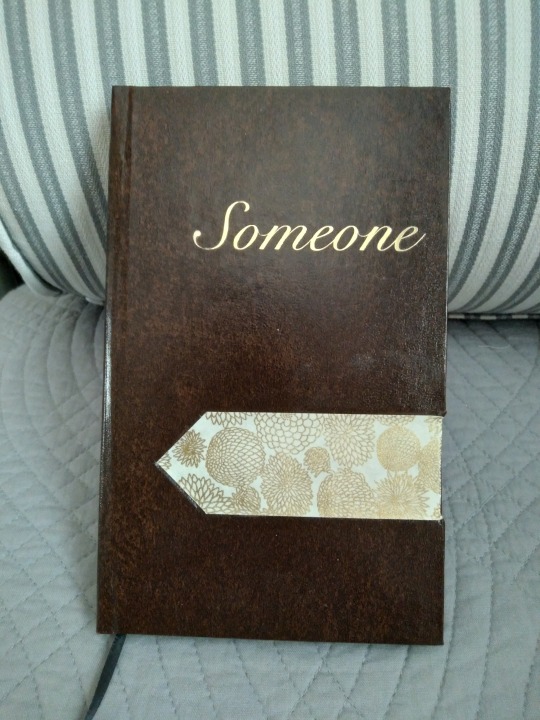
Binderary Book #3 is at last photographed and ready to share. This is Someone, a Good Omens human!au by Diminua, in which our favorite angel and demon are lonely and both turn to a matchmaking service to solve this problem. It sounds like a comedy but it isn't particularly, it starts off very lonely and a bit melancholy before they get a very quiet and beautiful happily-ever-after. As I told the author when I asked to bind it, it lives in my brain and radiates comfort.
I wanted to give it a binding that reflected the sort of classic romance that I feel is present in the story. I used a brown faux leather from Neenah Papers that's much darker and nicer than the faux leather I'd been using previously, though once it's on the book it looks a bit strongly like a bible cover. That's not so bad for a Good Omens fic though.
Have a look under the cut for detail shots; I feel like this one rewards a closer look.
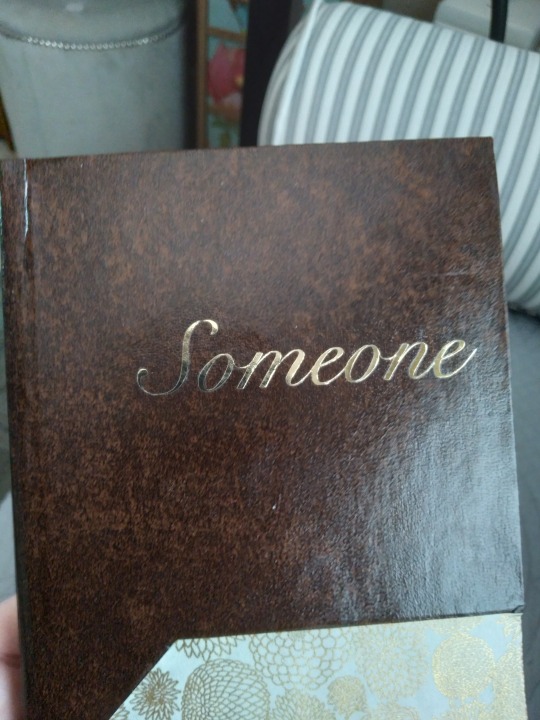

For the title we have gold foil htv. The author's name was supposed to go under it, in slightly smaller text, but it proved too great a challenge for my Cricut with this swirly font and the machine ate it.
The floral strip is a piece of chiyogami that I got in one of Chibijay's scrap packs. It's cream with gold flowers printed on it, which just screams "wedding" to me. There's a vivid moment in the story where they go to a flower market to pick out what they want for their ceremony, and I thought this was a nice echo of that. I was torn on this bind by wanting to do an accent strip (the way I usually do them, with the end hidden under a different material that covers the spine) and wanting to do a full leather bind since it's been ages. I've done some full cloth recently but the last full leather was a year ago. The compromise I reached was to cut that little point in it and embed it into a cutout to protect it. It went well, though there's a bit where it wraps around the edge and the leather tore so I had to patch it. It's not noticeable unless you're looking for it, so I'm calling it a win. And I love it, it looks like no other book I've made and it's perfect.


Top view, with premade end band. I would have loved to make custom ones but the book's too skinny. The gray ties in well with the endpapers though. The endpapers are a printed lokta that I got at Blick a while back without knowing what I was going to do with them, They're printed in gold and silver ferns and while they don't match the strip on the front I think they coordinate with it nicely. The first time I cut them I made them too small because the paper wasn't square and they had to be redone. There's a wrinkle from the casing in but we are none of us perfect.
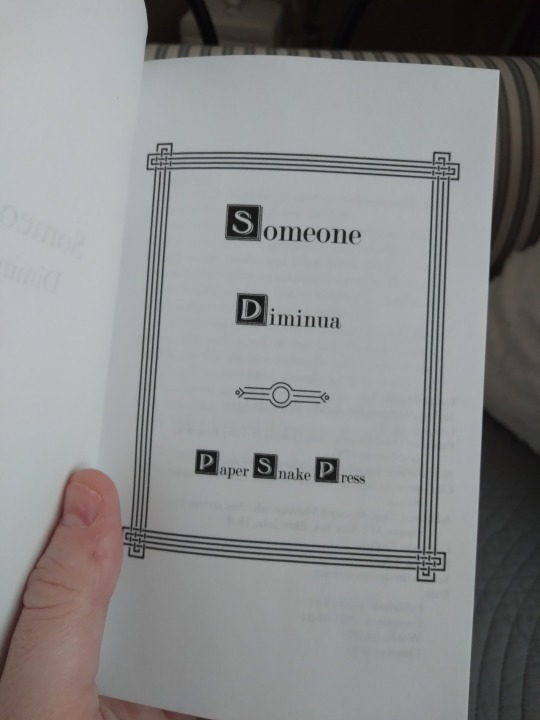
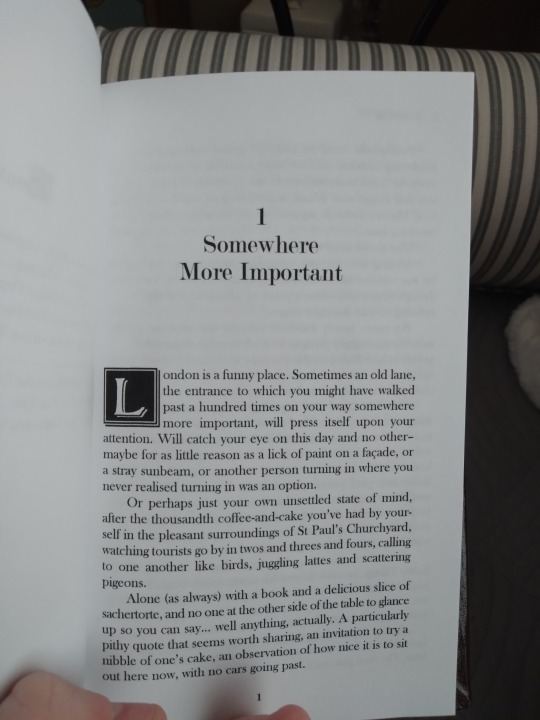
Title page and first page. The frame came from rawpixel, the little art deco widget came from vecteezy and I also used it as a scene break divider throughout the fic. The drop capital is from a dafont custom called Bolton Drop Caps and I love how they all coordinate with each other despite coming from such different sources. Something about legal quartos just begs me for drop caps. They're just the right thing to make the pages pop, and Bolton's a really nice font. Bold, but not frilly. The florals on the cover are very frilly and I like how the interior graphics balance them.
And that's it! This was a start-to-finish Binderary book; I had fully typeset it before the month began, but it hadn't been printed and all the physical work was done during February. I tend to pause between stages so this was practically a speed run for me and I couldn't be happier with it.
#good omens#bookbinding#fanbinding#snek makes books#i'm very pleased with this one#it's just. so cute#it fits the story#i think i nailed it
21 notes
·
View notes